|
|
General: ¿SABADO ROMANO O SABADO SEGUN LAS FASES DE LA LUNA?
Elegir otro panel de mensajes |
|
|
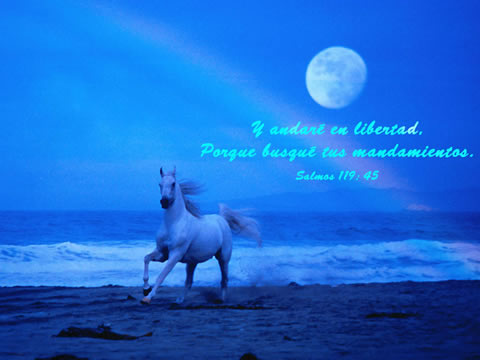
Sabado Romano o Shabat Lunar
¿Porque los adherentes del Judaismo son los "hijos falsos" guardan el "Sabado Romano"?
Como dijo un gran sabio de Israel "Es muy fácil ser JUDÍO, pero difícil querer ser un verdadero HIJO de ISRAEL"
Pero te dijo esta tremenda verdad "Hay mas Hijos de Israel, que NO saben que son descendientes, que Judios convertidos que No tienen nada de SEMITA".
"Acuérdense de la Torá de mi siervo Moshé. Recuerden los preceptos y estatutos que le di en Horeb para todo Israel [Las doces Tribus de Hijos de Israel>." Malaji (Malaquías) 4.4
"Acuérdense de la Torá de mi siervo Moshé…. le di en Horeb para todo Israel" ¿Acaso no lo sabía por medio de la Torá Oral?
Shabat: El día de reposo (Levítico) 23.3
Comentario Sobre el Shabat Lunar: Guardando el Shabat (lunar) conforme a la Torá, no de acuerdo a calendarios extranjeros. ¿Si el Calendario segun la Tora es lunar? Como es posible que el dia de Shabat sea el septimo dia (sabado) de calendarios extranjeros?
Si el Calendario es lunar y por ende las Convocaciones (Pesaj, Matzot, etc.) se rigen por la luna? Como es posible qui el Shabat (la primera Convocacisn) se rija por calendarios extranjeros? Calendario Hebreo, es y fue originalmente lunar y No luni-solar como es actualmente el calendario religioso judío que No es conforme a la Tora, de esta manera los días de Shabat son conforme a la luna, y no conforme a los días sábados del calendario solar Gregoriano.
La tierra fueron creados en Rosh Jodesh (Luna Nueva) y hasta que hubo "Luz" empieza la cuenta de los días de la semana, sin embargo tenemos en total 8 días.
Así es como identificamos al verdadero ISRAEL
La respuesta: son aquellos hijos de Israel que Guardan el Shabat Lunar. Como lo dijo el profeta:
"Así a dicho el Eterno que da el sol para luz del día, LAS LEYES DE LA LUNA... si faltaren estas leyes delante de Mí, dice el Eterno, también la descendencia de ISRAEL faltará como nación delante de Mí" Irmiahu (Jeremias). 31.34-35
Asi que Ningún Judío Moderno adherentes al Judaismo ha sido, es ni será nunca Hijo de Israel .
Como identificamos LOS HIJOS FALSOS:
"Porque este es un pueblo rebelde, de hijos falsos, hijos que no quieren escuchar la Torát HaShem" Ieshaiahu (30.9).
Es decir que la diferencia es ‘el origen’, unos procede de los hombres y otros del Creador. En el transcurso del tiempo la tendencia de Israel fue añadir y quitar a la Palabra que fue ordenada por medio de Moshe y los demás Profetas. Quienes son estos hijos falsos son lo que No que guardan Shabat según Lunar.
Guardando el Shabat (lunar) conforme a la Torá, no de acuerdo a calendarios extranjeros. ¿Si el Calendario segun la Tora es lunar? Como es posible que el dia de Shabat sea el septimo dia (sabado) de calendarios extranjeros?.
Quienes son los hijos falsos Son los adherentes del Judaismo que guardan el Sabado Romano.
El Shabat es llamado Ot (Señal): "Entre Mi y los hijos de Israel esta será una Ot (Señal) perpetua, porque en seis días hizo el Eterno los cielos y la tierra, mas en el séptimo día descansó y reposó". Sh’mot (Éxodo) 31.17
La Luna fue creada para marcar Otot (Señales) y Moadim (Convocaciones), si el Shabat es llamado Ot (Señal) y Moed (Convocación), obviamente esto indica que el Shabat depende de la Luna. Si la Luna fue creada para marcar las Moadim (Shabat, Pesaj, Matzot, Biqurim, Shavuot, Iom Terua, Iom Hakipurim, y Sukoq).
Pese a lo obvio que es, de acuerdo a la Torá, no solo que los meses dependen de la luna, sino también las semanas, hay quienes persisten en llamar Shabat a los días que los calendarios extranjeros llaman séptimo día, poniendo como pretexto algunos textos de la Torá. No existe base en la Torá que respalde el seguir un dictamen que vaya en contra de la Torá, al contrario, la Torá dice:
"Todo cuanto os ordeno, eso cuidaréis de hacer; no añadiréis a ello ni quitaréis de ello nada" Dvarim (Deut.) 13.1).
Entonces por otra parte, el asunto No es de ‘judios ortodoxos’ ni ‘gentiles’ ni ‘judios por conversion’ ni ‘judios religiosos’ ni ‘mesianicos’ ni ‘cristianos’ ‘gentiles judaizados’ conceptos tardios e ignorancia historica. Sino de los seguidores de Iehoshua que eran Hebreos y los hijos de Israel Dispersos de entre las naciones D’varim (Deut.) 28.64, Iaaqov (Jacobo) 1.1.
Los que verdaderamente son Israel que están dispersos entre las Naciones transmitiendo la Luz del Mashiaj, no por el hecho de haber nacidos en la tierra de Israel, sino los que son fieles al Eterno y por ende a su Torá y no una religión llamada (Judaismo).
|
|
|
|
|
|
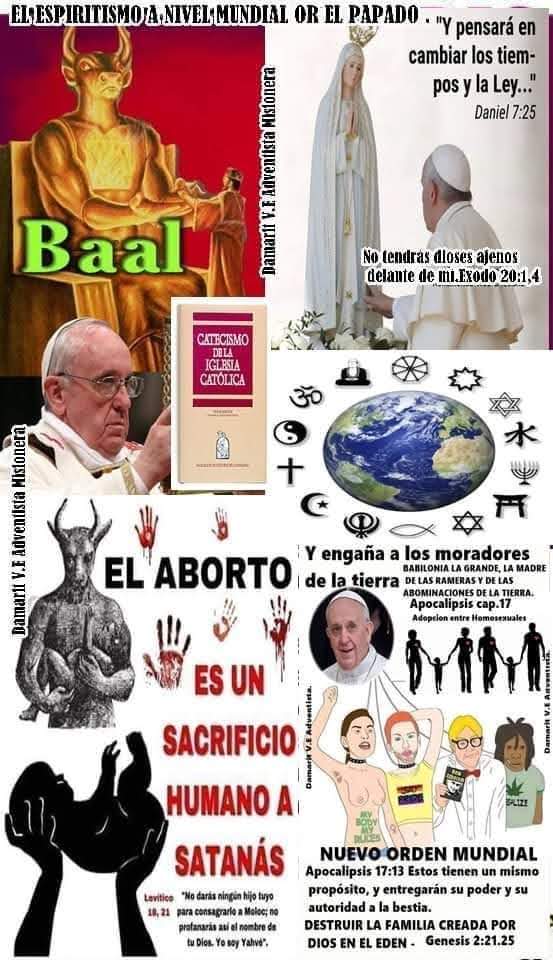
AGENDA 2030 DE SATANAS VATICANO JESUITAS COMUNISTAS ONU EEUU ELITS MUNDIALES HIJAS PROTESTANTISMO APOSTATA EEUU LAUDATO SI CAMBIO CLIMATICO EUCARISTIA MISA DOMINGO MARIA IDOLATRIA LOS MUERTOS ESPIRITISMO SODOMA GOMORRA LGTB EUTANASIA TODO LO QUE ES PECADO ESTO Y MAS SON LAS ENSEÑANZA VINO DE BABILONIA LA MARCA DE LA BESTIA DEL VATICANO ALIADOS DANIEL Y APOCALIPSIS 666.Daniel 7:25,2Tesal cap 2 ,Apocal 12:3,9,CAP14:8,11cap13,Cap 13:17,18 ,cap 16,cap 9:20,21 .ESTA AGENDA MUNDIAL ES DETRUIR EL REMANENTE DE CRISTO SU PUEBLO COMO LA EDAD MEDIA POR MEDIO DE LEYES HUMANAS SATANICAS Y POR ULTIMO DECRETO DE MUERTE INQUISICION MUNDIAL CONTRA LA SANTA BIBLIA SU SANTA LEY DEL CIELO SINAI DEL CIELO LA TIERRA ESCRITA CON SU DEDO EN PIEDRA EXODO 20:1,17,31:12,18 COMO ELIMINAR. EL SANTO SABADO SEPTIMO DIA DE LA CREACION SABADO SEPTIMO DIA GENESIS 1:1,2:1,4 ,Hebreos 4:4,9,11Mateo 24:20 ,APOCAL 13:7,13:15,14:13,17:6,18:24 ,12:17 Daniel 7:25,
Apocalipsis (de Juan) 16-> Ver. 13
Vi. Ver com. Ap 1:1. De la boca. La boca es el instrumento del habla. Estos “tres espíritus inmundos” que salen de las bocas del “dragón”, de la “bestia” y del “falso profeta”, representan la política que esta triple unión religiosa proclamará al mundo, la cual se menciona en el Ap 17:2 como el “vino” de Babilonia catecismo (ver com. Ap 16:14; Ap 17:2; Ap 17:6). Dragón satanás espiritismo . Ver com. Ap 12:3; Ap 13:1. El primer miembro de esta triple unión religiosa se identifica generalmente con el espiritismo o con el paganismo. Este último consiste principalmente en la adoración de espíritus maléficos, y por eso se parece esencialmente al espiritismo moderno tal como se practica en los países cristianos . La bestia. Ver com. Ap 13:1; Ap 17:3; Ap 17:8. Falso profeta. Evidentemente debe identificarse con la segunda bestia del Ap 13:11-17 (ver com. Ap 16:11), que apoya a la primera bestia de los Ap 16:1-10, y que por medio de los milagros que tiene el poder de hacer en presencia de la bestia (Ap 16:12-14), engaña a los hombres para que le hagan a ésta una “imagen”. Cf. Ap 19:20; Ap 20:10. Tres espíritus inmundos. Los defensores de ambas opiniones concuerdan en identificar al “dragón”, la “bestia” y el “falso profeta”, con el espiritismo moderno o paganismo, el papado, y el protestantismo apóstata (cf. Ap 13:4; Ap 13:14-15; Ap 19:20; Ap 20:10), respectivamente. Los “tres espíritus inmundos” evidentemente simbolizan o representan a este trío maléfico de poderes religiosos, que juntos constituyen la “gran Babilonia” de los últimos días (Ap 16:13-14; Ap 16:18-19; ver com. Ap 16:19; Ap 17:5). A manera de ranas. Tal vez no deba atribuirse ningún significado a esta comparación, que quizá sólo tiene el propósito de destacar lo repulsivo que son los “tres espíritus inmundos” delante de Dios. Esta unión son una ORGANISACION política religiosa mundial de personas que se unen bajo una falsa adoración satánica que incluye personas que obtendrá la marca de la Bestia Apocal 17:8,13 Apocal 19: 20 Pero la Bestia fue capturada, y con ella el falso profeta - el que había realizado al servicio de la Bestia las señales con que seducía a los que habían aceptado la marca de la Bestia y a los que adoraban su imagen los dos fueron arrojados vivos al lago del fuego que arde con azufre.SALID DE ELLA PUEBLO PARA NO SEAIS PARTE DE SUS PLAGAS Y MUERTE ETERNA APOCAL 18:4,5 .

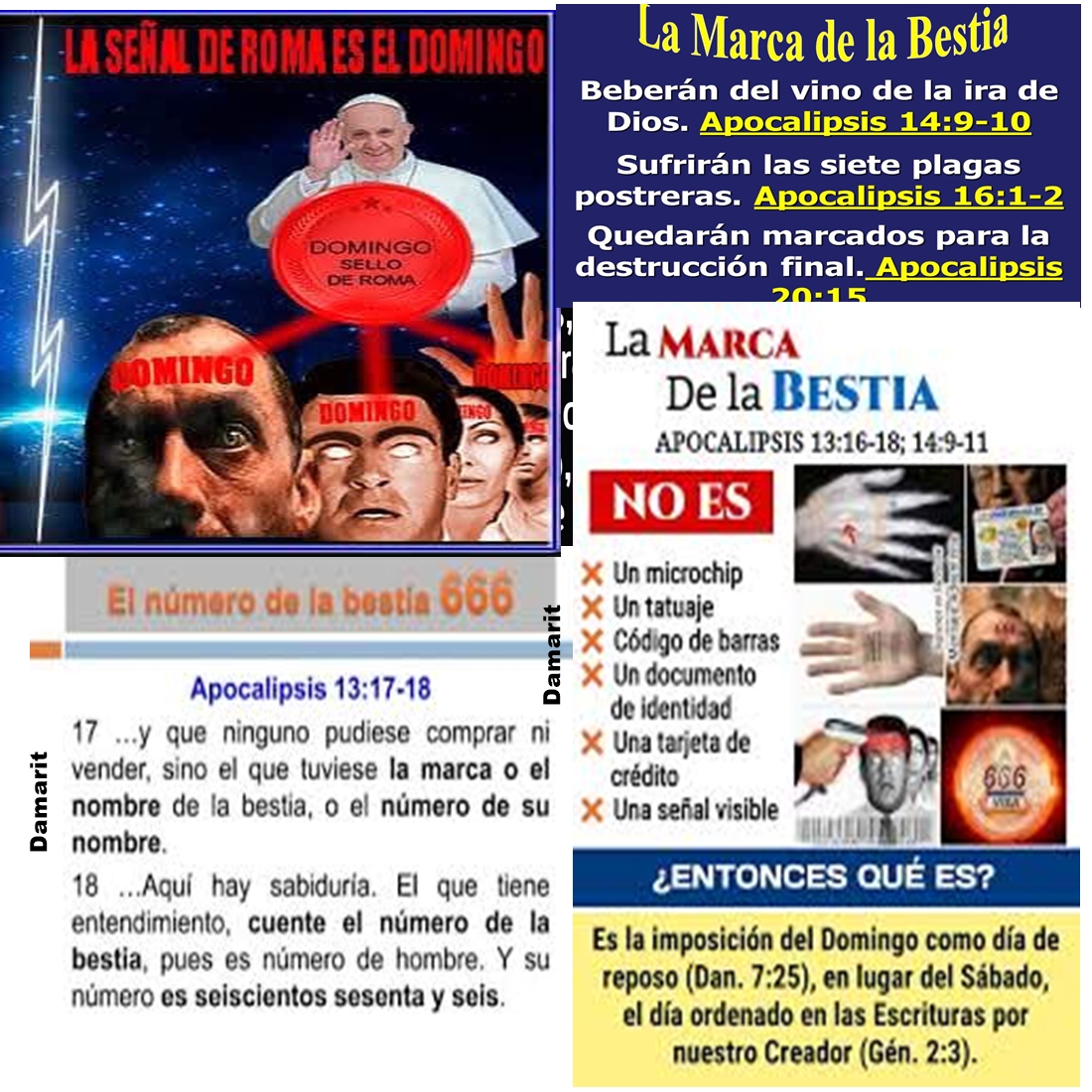
|
|
|
|
|
AGENDA 2030 VATICANO ONU EEUU El protestantismo apostata y el catolicismo actúan en concierto usaran la inquisicion contra cristo la santa biblia la ley del cielo sinai y sabado septimo dia Apoc 13:7,13:15,17:6,18:24 Se le concedió hacer la guerra a los santos y vencerlos; se le concedió poderío sobre toda raza, pueblo, lengua y nación.13:15 Se le concedió infundir el aliento a la imagen de la Bestia, de suerte que pudiera incluso hablar la imagen de la Bestia y hacer que fueran exterminados cuantos no adoraran la imagen de la Bestia.Protestantismo apóstata EEUU ONU LAUDATO SI CAMBIO CLIMATICO DOMINGO EUCARITIA CATECISMO LGTB NIÑOS EN COLEGIOS HOMOSEXUALES EUTANASIA. ISLAM ABORTO FEMINISMO SODOMA Y GOMORRA .666 cap13:17,18,14:8,11,17:8,13,16:13,14,El protestantismo [extenderá] la mano de camaradería al poder romano vaticano . Luego se decretará una ley contra el día de reposo de la creación de Dios sabado septimo dia , y entonces será que Dios hará “su extraña obra... su extraña operación” en la tierra con las plagas desastres contra vaticano aliados .No podemos ver cómo la Iglesia Romana vaticano catolica puede exonerarse de la acusación de idolatría falsa adoracion a maria los muertos purgatorio catecismo laudato si cambio climatico domingo eucaristia misa 666 marca de la bestia satanas vaticano ,Apo12:3,9,cap13:1,10,13:11,18 Protestantismo aposta Y esta es la religión que los protestantes están comenzando a considerar tan favorablemente, y que eventualmente se unirá con el protestantismo apostata . Sin embargo, esta unión no ocurrirá por un cambio en el catolicismo, porque Roma vaticano papado nunca cambia. Pretende ser infalible. Quien cambiará será el protestantismo. La adopción de su parte de ideas liberales lo pondrá en una posición en la cual pueda estrechar la mano del catolicismo.—El llamado mundo protestante formará una coalición con el hombre de pecado papado , y la iglesia y el mundo estarán en una corrupta armonía.
El romanismo en el Viejo Mundo y el protestantismo apóstata en la América del Norte actuarán de la misma manera contra los que honren todos los preceptos divinos sabado septimo dia la ley del cielo sinai la creacion .Genesis 1:1,2:1,4,Exodo 20:1,17,31:12,18 Apo 14:7,14:12,22:14,7:2,3 12:17 ,Daniel 7:25 ,15:2 Hebreos 4:4,9,11Mateo 24:20 .
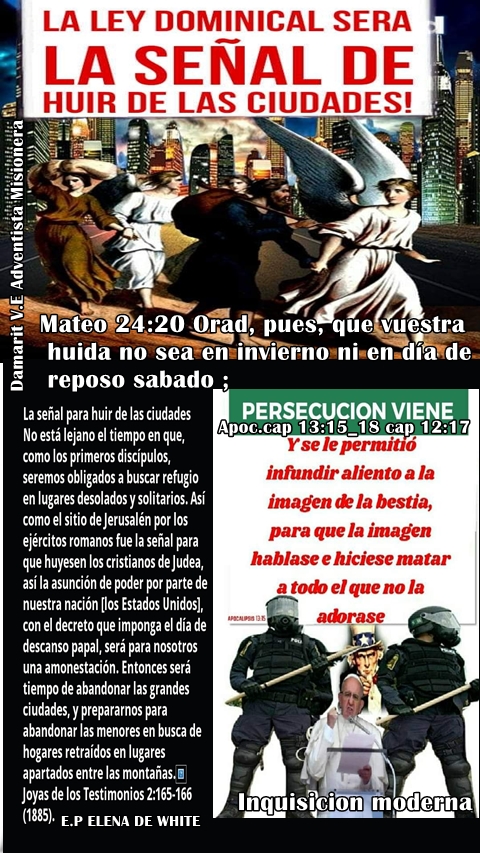 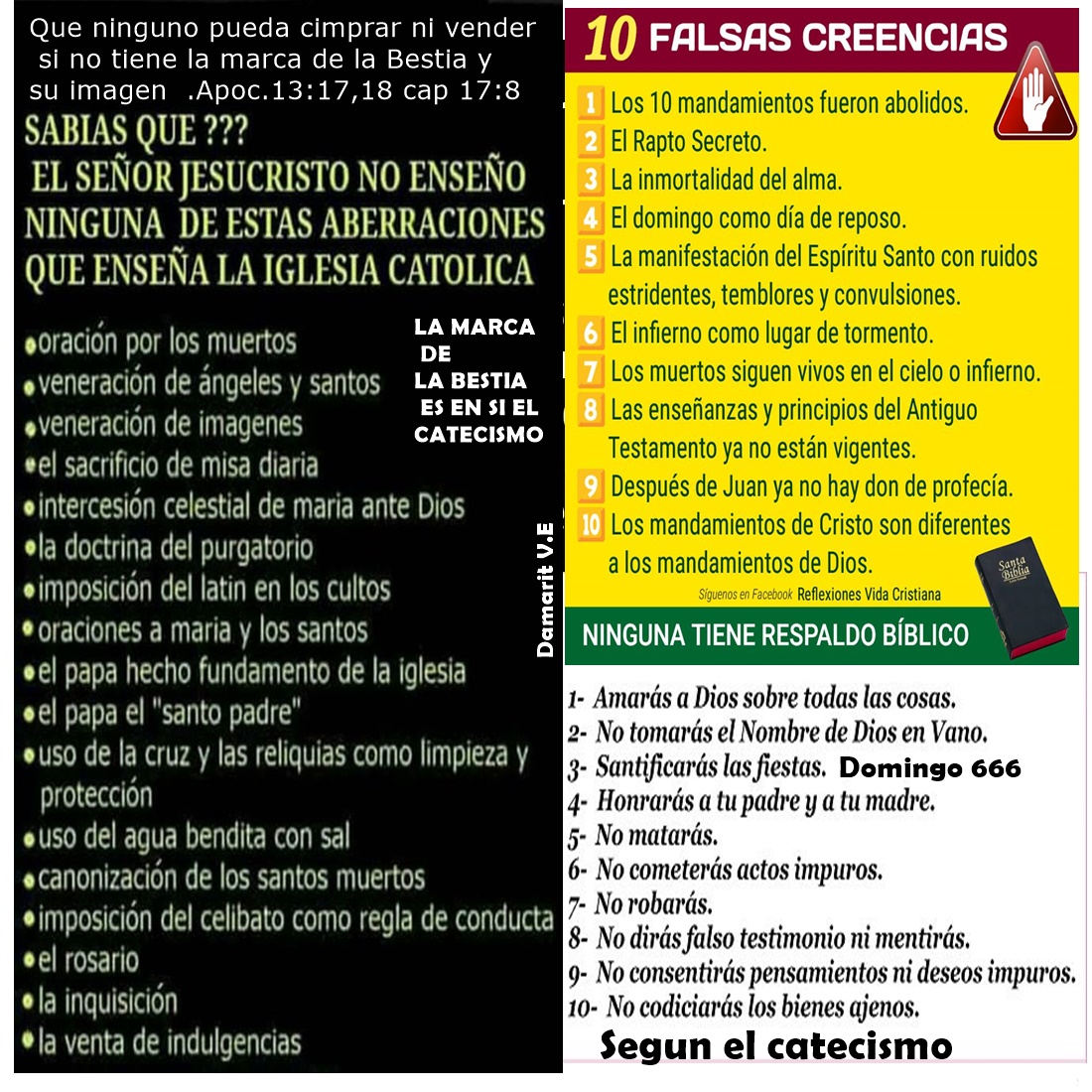  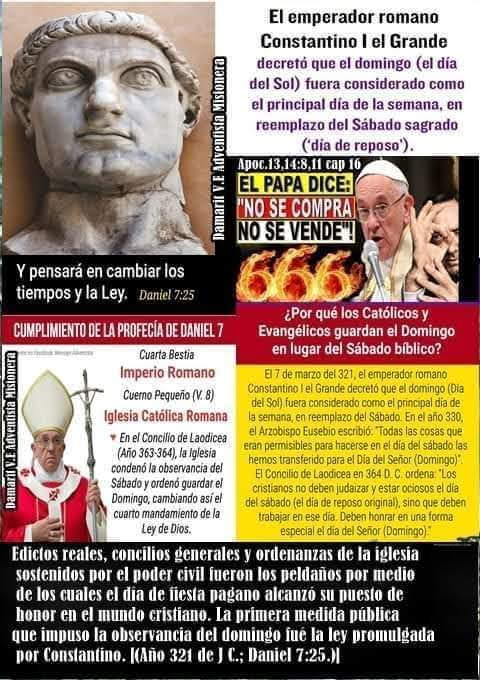 .jpg)
|
|
|
|
|
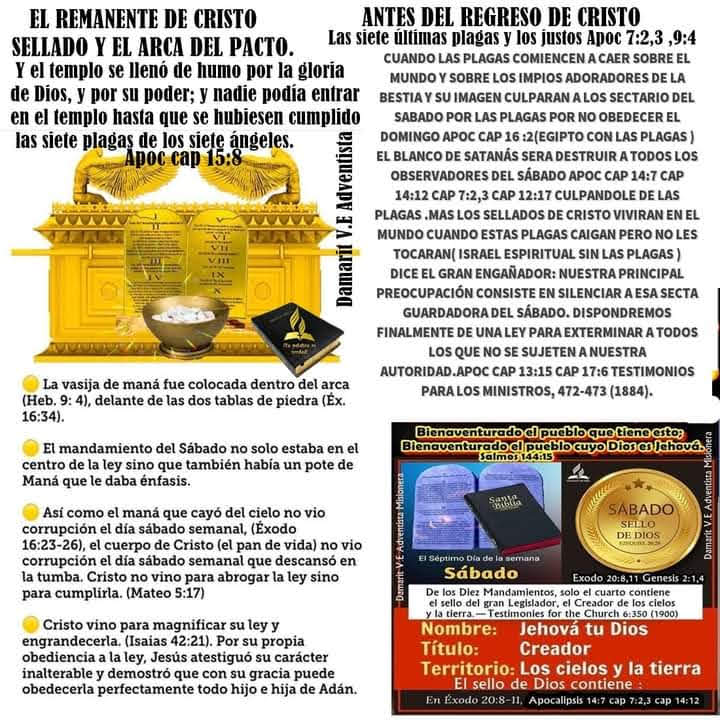  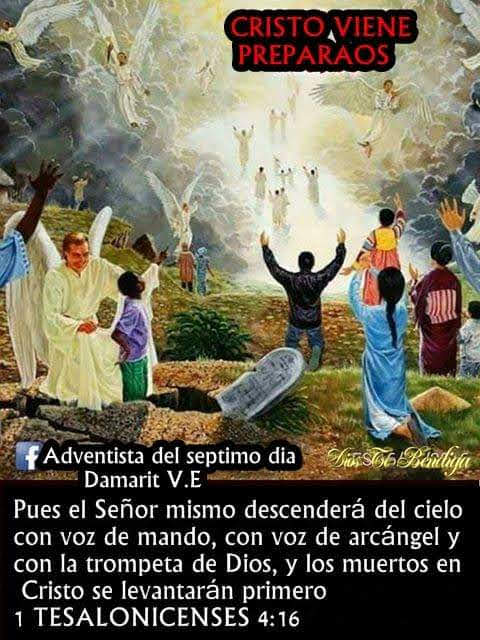 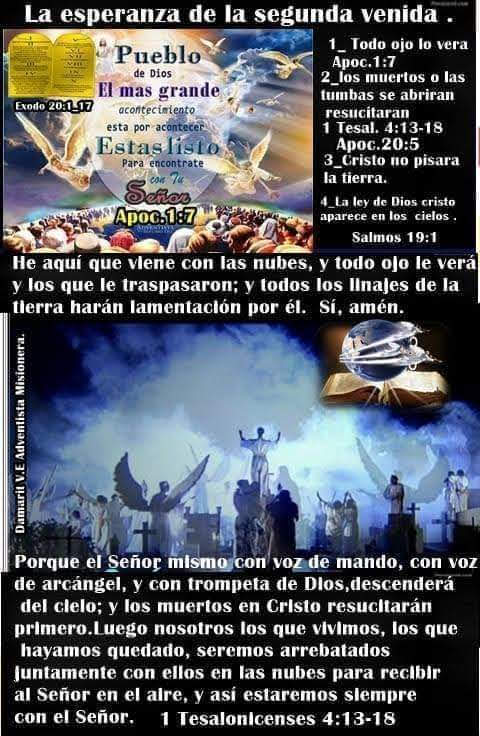
CRISTO NUESTRO DIOS CREADOR SALVADOR VIENE PRONTO
POR LOS QUE VIVE EN UN ESCRITO ESTA EN LA SANTA BIBLIA APOCAL 19:
10 Entonces me postré a sus pies para adorarle, pero él me dice: «No, cuidado; yo soy un siervo como tú y como tus hermanos que mantienen el testimonio de Jesús. A Dios tienes que adorar.» El testimonio de Jesús es el espíritu de profecía.
11 Entonces vi el cielo abierto, y había un caballo blanco: el que lo monta se llama «Fiel» y «Veraz»; y juzga y combate con justicia.
12 Sus ojos, llama de fuego; sobre su cabeza, muchas diademas; lleva escrito un nombre que sólo él conoce;
13 viste un manto empapado en sangre y su nombre es: La Palabra de Dios.
Apocalipsis (de Juan) 19-> Ver. 10
[V.10-> Me postré. Una posición de reverencia y adoración típica de Oriente. Es una actitud de gratitud y gozo profundos porque la fiesta de bodas es una celebración de triunfo sobre las fuerzas del mal, el cual ha tratado siempre de impedir este magno acontecimiento. Esta es la primera ocasión en la cual Juan respondió de esta manera al mensaje del ángel. Representa la profundidad del 886 sentimiento que lo conmovió. Mira, no lo hagas. Cf. Hch 10:26. Consiervo tuyo. Mejor “compañero de esclavitud”. ¡Qué privilegio es que los fieles siervos en esta tierra puedan compartir compañerismo de los ángeles celestiales y ser sus colaboradores! De tus hermanos. Es decir, consiervo de tus hermanos. Algunos consideran que esta designación es una evidencia de que el que hablaba era un miembro de la familia humana, como Enoc, Elías, Moisés, o uno de lo santos que resucitaron con Cristo cuando él resucitó (ver com. Mat 27:50-53); sin embargo, no hay evidencia directa en las Escritura de que un ser humano trasladado al cielo haya desempeñado alguna vez el papel de un ángel, como aquí, para revelar la verdad sus prójimos humanos . El testimonio de Jesús. Ver com. Ap 1:2 :17. El espíritu de la profecía. En cuanto a la palabra “profecía”, compárese con la palabra “profeta” en Mat 11:9. El Espíritu Santo os envió para dar testimonio de Jesús (Jn 15:26), y su testimonio es equivalente al de Jesús en persona. El espíritu de profecía es uno de los dones del Espíritu (ver com. 1Co 12:10; Efe 4:11). En cuanto a la manifestación de este don entre el pueblo de Dios en los últimos días, ver la Nota Adicional a final de este capítulo; com. Ap 12:17. ]
Apocalipsis (de Juan) 19-> Ver. 11
[V.11-> Abierto. El cielo estaba abierto cuando la atención de Juan fue dirigida hacia él, permaneció abierto. Cf. Ap 4:1; Ap 11:19; Ap 15:5. Se ve a Cristo acompañado por los ejércitos celestiales (Ap 19:14) y descendiendo de los cielos como Rey de reyes (Ap 19:16) con poder y majestad para liberar a su pueblo fiel de aquellos que estarán resueltos a destruirá (cf. CS 698-699). La escena descrita en los Ap 19:11-21 es la culminación de “la batalla d aquel gran día del Dios Todopoderoso”, que a menudo es llamada la batalla del Armagedón (ver com. Ap 16:12-19; cf. 6T 406). He aquí. Cf. com. Ap 21:5. Caballo blanco. Los caballos se usaban en los tiempos bíblicos casi exclusivamente para la guerra o las actividades de gobierno. Cuando el caballo se usa simbólicamente en la Biblia, como aquí, generalmente simboliza guerra (cf. Exo 15:21; Isa 43:17; Jer 8:6; Eze 38:15; Zac 10:3; Ap 14:20; ver com. Ap 6:2). El blanco simboliza la santidad de carácter (ver com. Ap 3:4; Ap 6:2; Ap 7:14). Los caballos blancos siempre han sido preferido por los reyes y jefes militares. Cristo ha recibido el derecho de gobernar esta tierra com Rey de reyes (ver com. Ap 19:1; Ap 19:7), y ahora simbólicamente aparece como un guerrero que cabalga vencedor sobre un hermoso caballo blanco, que para ocupar su dominio legítimo y acompañar a su pueblo fiel a su regreso de la “cena de las bodas” (Ap 19:9; ver com. Ap 11:15). Cf. Isa 63:1-6. Fiel y Verdadero. Debe recordarse que en la Biblia los nombres describen el carácter (ver com. Hch 3:16), y que por lo tanto lo nombres que aquí se le atribuyen a Cristo lo representan específicamente en su papel de paladín de su pueblo perseguido. Hay cuatro declaraciones en cuanto al nombre de Cristo en relación con la batalla de Ap 19:11-21. 1. Se lo llama a Cristo “Fiel y Verdadero” (Ap 19:11) porque ahora aparece, según su promesa (Jn 14:1-3), para liberar a los suyos. A ellos les ha parecido que ha demorado su venida (ver com. Ap 16:15), pero 1º han “esperado”, y ahora aparece con el propósito de salvarlos (Isa 25:9; cf. Ap 16:17). 2.El “nombre escrito que ninguno conoció sino él mismo” (Ap 19:12) representa su función desconocida hasta este momento, pero ahora aparece desempeñándola como el vengador de su pueblo (ver com. Ap 16:1). En el desempeño de esta “extraña obra” (Isa 28:21) actúa en un papel nuevo tanto para los hombres como para los ángeles. 3.Pero como el vengador y libertador d su pueblo, es todavía “el Verbo de Dios” (Ap 19:13). Es “el Verbo de Dios” en acción para cumplir la voluntad del Padre en la tierra; ahora en castigo, como anteriormente e1 fue en misericordia (ver com. Jn 1:1-3 Ap 19:15). 4.El título “Rey de reyes y Señor de señores” (Ap 19:16) se aplicará en ese tiempo, de sentido especial, a Cristo (ver com. Ap 17:14). Todo poder ha sido entregado en su manos (1Co 15:25). Satanás aspiró egoísta mente a la suprema posición que había sido reservada para Cristo como Hijo de Dios (Isa 14:12-14; Ap 12:7-9; PP 14); pero e Redentor, que no consideró como usurpación ser igual a Dios, voluntariamente dejó un lado por un tiempo el ejercicio pleno de los atributos y las prerrogativas de la Deidad (ver t. V, com. Fil 2:6-8), y así demostró ser digno de recibir el honor y la jerarquía 887 implícita en el título “Rey de reyes y Señor de señores”. Con justicia. Su causa es completamente justa (ver com. Ap 15:3; Ap 16:5). Los gobernantes de la tierra han reñido guerras a través de la historia por motivos egoístas y para lograr un engrandecimiento personal o nacional. Cf. Isa 11:1-5. Juzga y pelea. Ejecuta el juicio al librar la batalla. Esta guerra es contra las fuerzas políticas y militares de la tierra, las cuales se habían reunido para destruir a los siervos fieles de Dios (ver com. Ap 13:15; Ap 16:13-14; Ap 16:16-17). ]
Apocalipsis (de Juan) 19-> Ver. 12
[V.12-> Sus ojos. Ver com. Ap 1:14. A medida que Cristo, el gran paladín de la justicia eterna, avanza, no hay nada que escape a su observación. Diademas. Gr. diád’ma (ver com. Ap 12:3). La diád’ma nunca se refiere a la recompensa de los santos. Siempre se aplica a la corona de la realeza. Además de las muchas coronas reales que Cristo recibe como Rey de reyes, también lleva la guirnalda de la victoria, el stéfanos, pues también venció a Satanás (ver com. Ap 12:3; Ap 14:14). Un nombre. Ver com. Ap 19:11; cf. com. Ap 2:17. ]
|
|
|
|
|
| ANTES DEL REGRESO DE CRISTO ADIESTRAMIENTO DE LA HUMANIDAD DE SATANAS AGENDA 2030 VATICANO Los Jesuitas son los verdaderos autores del socialismo-comunismo Ignacio de Loyola inquisición ONU EEUU Y ALIADOS DEL MUNDO LAUDATO SI CAMBIO CLIMATICO EUCARISTIA DOMINGO CATECISMO REZAR A MARIA LOS MUERTOS PURGATORIO PEOR QUE SODOMA Y GOMORRA LGTB ,EUTANASIA ISLAM ,FEMINISMO ABORTO ,MATAR TODO QUIEN SE OPONGA INQUISICION ,ETC TODO LO QUE ES PECADO Apocalipsis 14:8 Y un segundo Angel le siguió diciendo: «Cayó, cayó la Gran Babilonia, la que dio a beber a todas las naciones el vino del furor. Catecismo LAUDATO si cambio climático su vino 666 CAP13:17,18,14:8,11,cap16 »Apoc cap 17 ,cap18 .Apocalipsis (de Juan) 16-> Ver. 13 Vi. Ver com. Ap 1:1. De la boca. La boca es el instrumento del habla. Estos “tres espíritus inmundos” que salen de las bocas del “dragón”, de la “bestia” y del “falso profeta”, representan la política que esta triple unión religiosa proclamará al mundo, la cual se menciona en el Ap 17:2 como el “vino” de Babilonia (ver com. Ap 16:14; Ap 17:2; Ap 17:6). Dragón. Ver com. Ap 12:3; Ap 13:1. El primer miembro de esta triple unión religiosa se identifica generalmente con el espiritismo o con el paganismo. Este último consiste principalmente en la adoración de espíritus maléficos, y por eso se parece esencialmente al espiritismo moderno tal como se practica en los países cristianos. La bestia. Ver com. Ap 13:1; Ap 17:3; Ap 17:8. Falso profeta. Evidentemente debe identificarse con la segunda bestia del Ap 13:11-17 (ver com. Ap 16:11), que apoya a la primera bestia de los Ap 16:1-10, y que por medio de los milagros que tiene el poder de hacer en presencia de la bestia (Ap 16:12-14), engaña a los hombres para que le hagan a ésta una “imagen”. Cf. Ap 19:20; Ap 20:10. Tres espíritus inmundos. Los defensores de ambas opiniones concuerdan en identificar al “dragón”, la “bestia” y el “falso profeta”, con el espiritismo moderno o paganismo, el papado, y el protestantismo apóstata (cf. Ap 13:4; Ap 13:14-15; Ap 19:20; Ap 20:10), respectivamente. Los “tres espíritus inmundos” evidentemente simbolizan o representan a este trío maléfico de poderes religiosos, que juntos constituyen la “gran Babilonia” de los últimos días (Ap 16:13-14; Ap 16:18-19; ver com. Ap 16:19; Ap 17:5). A manera de ranas. Tal vez no deba atribuirse ningún significado a esta comparación, que quizá sólo tiene el propósito de destacar lo repulsivo que son los “tres espíritus 858 inmundos” delante de Dios.Apocalipsis (de Juan) 16-> Ver.10-> El trono Vaticano iglesias estos son las hijas PROTESTANTISMO apóstata . ”El trono de la bestia” es evidentemente su sede. “La bestia” representa en primer lugar al papado que ha resurgido, no tanto en su aspecto religioso como en su pretendido papel de potencia mundial que domina a otras potencias de mundo (ver com. Ap 13:1-2; Ap 13:10; Ap 17:3; Ap 17:8-9; Ap 17:11). Su reino. Exceptuando el pequeño remanente que aún resiste su supremacía, Satanás cuenta a todo el mundo como sus súbditos, y por medio del papado que ha restablecido procurará en forma particular asegurar su dominio indiscutido sobre toda la raza humana Ap 16:13-14; Ap 17:8; Ap 17:12; cf. Ap 19:19). Durante esta plaga el mundo entero parece estar envuelto por un manto de tinieblas, o sea, que mientras los hombres impenitentes estén buscando la luz en un mundo espiritualmente oscuro (Ap 16:8-9), Dios enviará sobre ellos tinieblas físicas que simbolizan la noche espiritual más oscura que cubrirá la tierra (ver com. Ap 16:13-14). Cubrió de tinieblas. El griego dice “su reino quedó oscuro, sugiriendo que permaneció a oscuras durante cierto tiempo. Estas son tinieblas físicas (ver com. Ap 16:1), acompañadas de frío y angustia. La ausencia de luz y calor será tanto más impresionante y dolorosa después del calor intenso experimentado durante la cuarta plaga. Mordían de dolor sus lenguas. El tiempo del verbo griego indica acción continuada: “seguían mordiéndose o “se mordían vez tras vez” Un intenso frío posiblemente acompañado a las prolongadas tinieblas. ]Todo ser humano que se unió con el Vaticano creyendo era la iglesia de Cristo tendrá 666 y las PLAGAS Cristo advierte salir de esta falsa adoración Apoc 18:2,3,4,5 .APOCAL 14:1,7vers 12,7:2,322:14 es la ley del cielo Sinaí Éxodo 20:1,17 Génesis 1:1,2:1,4 22:14 ,15:2 es Cristo su santo sábado séptimo día su sello su iglesia es APOCAL cap 10 ,12:1.12:17 .mensaje de los tres ángeles cap 14 Adventistas del séptimo día
|
|
|
|
|
ANTES DEL REGRESO DE CRISTO ADIESTRAMIENTO DE LA HUMANIDAD DE SATANAS AGENDA 2030 VATICANO Los Jesuitas son los verdaderos autores del socialismo-comunismo Ignacio de Loyola inquisición ONU EEUU Y ALIADOS DEL MUNDO LAUDATO SI CAMBIO CLIMATICO EUCARISTIA DOMINGO CATECISMO REZAR A MARIA LOS MUERTOS PURGATORIO PEOR QUE SODOMA Y GOMORRA LGTB ,EUTANASIA ISLAM ,FEMINISMO ABORTO ,MATAR TODO QUIEN SE OPONGA INQUISICION ,ETC TODO LO QUE ES PECADO Apocalipsis 14:8 Y un segundo Angel le siguió diciendo: «Cayó, cayó la Gran Babilonia, la que dio a beber a todas las naciones el vino del furor. Catecismo LAUDATO si cambio climático su vino 666 CAP13:17,18,14:8,11,cap16 »Apoc cap 17 ,cap18 .Apocalipsis (de Juan) 16-> Ver. 13 Vi. Ver com. Ap 1:1. De la boca. La boca es el instrumento del habla. Estos “tres espíritus inmundos” que salen de las bocas del “dragón”, de la “bestia” y del “falso profeta”, representan la política que esta triple unión religiosa proclamará al mundo, la cual se menciona en el Ap 17:2 como el “vino” de Babilonia (ver com. Ap 16:14; Ap 17:2; Ap 17:6). Dragón. Ver com. Ap 12:3; Ap 13:1. El primer miembro de esta triple unión religiosa se identifica generalmente con el espiritismo o con el paganismo. Este último consiste principalmente en la adoración de espíritus maléficos, y por eso se parece esencialmente al espiritismo moderno tal como se practica en los países cristianos. La bestia. Ver com. Ap 13:1; Ap 17:3; Ap 17:8. Falso profeta. Evidentemente debe identificarse con la segunda bestia del Ap 13:11-17 (ver com. Ap 16:11), que apoya a la primera bestia de los Ap 16:1-10, y que por medio de los milagros que tiene el poder de hacer en presencia de la bestia (Ap 16:12-14), engaña a los hombres para que le hagan a ésta una “imagen”. Cf. Ap 19:20; Ap 20:10. Tres espíritus inmundos. Los defensores de ambas opiniones concuerdan en identificar al “dragón”, la “bestia” y el “falso profeta”, con el espiritismo moderno o paganismo, el papado, y el protestantismo apóstata (cf. Ap 13:4; Ap 13:14-15; Ap 19:20; Ap 20:10), respectivamente. Los “tres espíritus inmundos” evidentemente simbolizan o representan a este trío maléfico de poderes religiosos, que juntos constituyen la “gran Babilonia” de los últimos días (Ap 16:13-14; Ap 16:18-19; ver com. Ap 16:19; Ap 17:5). A manera de ranas. Tal vez no deba atribuirse ningún significado a esta comparación, que quizá sólo tiene el propósito de destacar lo repulsivo que son los “tres espíritus 858 inmundos” delante de Dios.Apocalipsis (de Juan) 16-> Ver.10-> El trono Vaticano iglesias estos son las hijas PROTESTANTISMO apóstata . ”El trono de la bestia” es evidentemente su sede. “La bestia” representa en primer lugar al papado que ha resurgido, no tanto en su aspecto religioso como en su pretendido papel de potencia mundial que domina a otras potencias de mundo (ver com. Ap 13:1-2; Ap 13:10; Ap 17:3; Ap 17:8-9; Ap 17:11). Su reino. Exceptuando el pequeño remanente que aún resiste su supremacía, Satanás cuenta a todo el mundo como sus súbditos, y por medio del papado que ha restablecido procurará en forma particular asegurar su dominio indiscutido sobre toda la raza humana Ap 16:13-14; Ap 17:8; Ap 17:12; cf. Ap 19:19). Durante esta plaga el mundo entero parece estar envuelto por un manto de tinieblas, o sea, que mientras los hombres impenitentes estén buscando la luz en un mundo espiritualmente oscuro (Ap 16:8-9), Dios enviará sobre ellos tinieblas físicas que simbolizan la noche espiritual más oscura que cubrirá la tierra (ver com. Ap 16:13-14). Cubrió de tinieblas. El griego dice “su reino quedó oscuro, sugiriendo que permaneció a oscuras durante cierto tiempo. Estas son tinieblas físicas (ver com. Ap 16:1), acompañadas de frío y angustia. La ausencia de luz y calor será tanto más impresionante y dolorosa después del calor intenso experimentado durante la cuarta plaga. Mordían de dolor sus lenguas. El tiempo del verbo griego indica acción continuada: “seguían mordiéndose o “se mordían vez tras vez” Un intenso frío posiblemente acompañado a las prolongadas tinieblas. ]Todo ser humano que se unió con el Vaticano creyendo era la iglesia de Cristo tendrá 666 y las PLAGAS Cristo advierte salir de esta falsa adoración Apoc 18:2,3,4,5 .APOCAL 14:1,7vers 12,7:2,322:14 es la ley del cielo Sinaí Éxodo 20:1,17 Génesis 1:1,2:1,4 22:14 ,15:2 es Cristo su santo sábado séptimo día su sello su iglesia es APOCAL cap 10 ,12:1.12:17 .mensaje de los tres ángeles cap 14 Adventistas del séptimo día 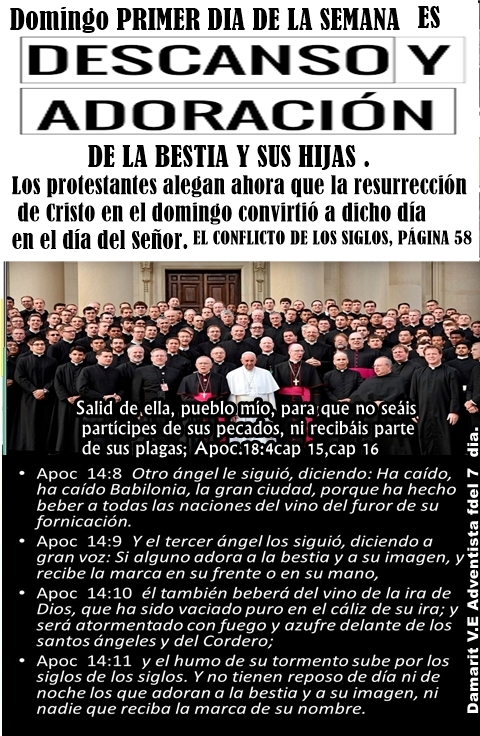 |
|
|
|
|
| EL PAPA FRANCISCO LLAMA AL ECUMENISMO QUE SIGNIFICA El ecumenismo es la tendencia o movimiento que busca la instauración de la unidad de los cristianos, es decir, la unidad de las distintas confesiones religiosas cristianas.UNION MUNDIAL RELIGIONES QUE DICE DE LA SANTA BIBLIA DE ESTA UNION .ESTA UNION SE DARA POR EL LAUDATO SI CAMBIO CLIMATICO INSTITUIDO POR VATICANO ONU JESUITAS COMUNISMO EEUU ESTA UNION SERA UNIVERSAL ESTA UNION ES LA MARCA DE LA BESTIA DEL VATICANO SATANAS LAUDATO SI CAMBIO CLIMATICO DOMINGO MISA EUCARITIA MARIA ADORACION DE LOS MUERTOS 666 Apoc12:3,9,CAP13,CAP17 cap 16 APOCAL 14:8 Y un segundo Angel le siguió diciendo: «Cayó, cayó la Gran Babilonia, la que dio a beber a todas las naciones el vino del furor.EL VINO DE BABILONIA ES CATECISMO DOMINGO LAUDATO SI MISA REZAR MARIA LOS MUERTOS LGTB ABORTO ISLAM EUTANASIA PEDOFILIA IDOLATRIA PAGANISMO PEOR QUE SODOMA GOMORRA .Apoc 9:20,21
Apocalipsis (de Juan) 16-> Ver. 13 Vi. Ver com. Ap 1:1. De la boca. La boca es el instrumento del habla. Estos “tres espíritus inmundos” que salen de las bocas del “dragón”, de la “bestia” y del “falso profeta”, representan la política que esta triple unión religiosa proclamará al mundo, la cual se menciona en el Ap 17:2 como el “vino” de Babilonia (ver com. Ap 16:14; Ap 17:2; Ap 17:6). Dragón. Ver com. Ap 12:3; Ap 13:1. El primer miembro de esta triple unión religiosa se identifica generalmente con el espiritismo o con el paganismo. Este último consiste principalmente en la adoración de espíritus maléficos, y por eso se parece esencialmente al espiritismo moderno tal como se practica en los países cristianos. La bestia. Ver com. Ap 13:1; Ap 17:3; Ap 17:8. Falso profeta. Evidentemente debe identificarse con la segunda bestia del Ap 13:11-17 (ver com. Ap 16:11), que apoya a la primera bestia de los Ap 16:1-10, y que por medio de los milagros que tiene el poder de hacer en presencia de la bestia (Ap 16:12-14), engaña a los hombres para que le hagan a ésta una “imagen”. Cf. Ap 19:20; Ap 20:10. Tres espíritus inmundos. Los defensores de ambas opiniones concuerdan en identificar al “dragón”, la “bestia” y el “falso profeta”, con el espiritismo moderno o paganismo, el papado, y el protestantismo apóstata (cf. Ap 13:4; Ap 13:14-15; Ap 19:20; Ap 20:10), respectivamente. Los “tres espíritus inmundos” evidentemente simbolizan o representan a este trío maléfico de poderes religiosos, que juntos constituyen la “gran Babilonia” de los últimos días (Ap 16:13-14; Ap 16:18-19; ver com. Ap 16:19; Ap 17:5). A manera de ranas. Tal vez no deba atribuirse ningún significado a esta comparación, que quizá sólo tiene el propósito de destacar lo repulsivo que son los “tres espíritus 858 inmundos” delante de Dios..ESTA ES UNA ORGANISACION POLITICA RELIGIOSA MUNDIAL DE PERSONAS QUE SE UNIERON AL PAPADO SATANAS PARA SER MARCADOS 666PARA MUERTE ETERNA APOCAL 19:20,21 20 Pero la Bestia fue capturada, y con ella el falso profeta - el que había realizado al servicio de la Bestia las señales con que seducía a los que habían aceptado la marca de la Bestia y a los que adoraban su imagen - los dos fueron arrojados vivos al lago del fuego que arde con azufre.La gente quedó del todo engañada. Se le enseñó que el papa y los sacerdotes eran los representantes de Cristo, cuando en verdad lo eran de Satanás, y a Satanás adoraban cuantos ante ellos se postraban para pedir perdón por sus PECADO confesandolo a satanás lo hacen .El papa es el anticristo, y su trono es el de Satanás mismo Apoc 16:10 Vaticano los que recibirán la marca 666 que se unieron . QUIEN CREE QUE EL VATICANO ES LA IGLESIA DE CRISTO Y NO ACEPTA ESTA ADVERTENCIA BIBLICA SERA DESTRUIDO POR CRISTO CON LAS PLAGAS Y MUERTE ETERNA POR ESO CRISTO NUESTRO DIOS ADVIERTE ..Apoc 18:2,4 Luego oí otra voz que decía desde el cielo: «Salid de ella, pueblo mío, no sea que os hagáis cómplices de sus pecados y os alcancen sus plagas.5 Porque sus pecados se han amontonado hasta el cielo y Dios se ha acordado de sus iniquidades. ESTA UNION MUNDIAL ES ENCONTRA DEL SABADO SEPTIMO DIA CONTRA LA LEY DEL CIELO LA TIERRA EXODO 20:1,17,31:18 GENESIS 1:1,2:1,4 CONTRA TODOS QUE ADOREN A CRISTO SU PUEBLO SU LEY DEL MATRIMONIO HOMBRE MUJER.APOC14:1,7,VERS12,7:2,3,22:14,9:4,Apoc15:2 .ESTA UNION IRA CONTRA CRISTO MISMO SU PUEBLO DECRETANDO LA MUERTE POR OBEDECER EL SABADO SEPTIMO DIA ESTO SERA LA INQUISICION MUNDIAL CUANDO LAS PLAGAS CAEN SOBRE TODOS LOS DEL VATICANO 666 APOCAL 14:8,11,cap16,16:10Apoc 13:17,13:15,17:6,18:24 .
|
|
|
|
|
ESCRITO ESTA EN LA SANTA BIBLIA CRISTO EL CREADOR DEL SABADO SEPTIMO DIA DE LA HUMANIDAD EL MUNDO TODO EL UNIVERSO GENESIS 1:1,2:1,4Apic14:7,14:12,22:14,15:2
Éxodo 31-> Ver. 18
[V.18-> Dos tablas del testimonio. Dios le había dicho a Moisés que dentro del arca, en el lugar santísimo, debía ponerse este "testimonio" (Exo 25:16). Puesto que ésta era la principal función del arca, y el arca era el mueble más sagrado del tabernáculo, es apropiado que esta sección que trata de la estructura del tabernáculo y de los que en él oficiaban terminara con una declaración concerniente a lo que les daba su significado al arca y al tabernáculo.Apoc15:1 ,15:8 En vez de dos tablas "debería leerse "las dos tablas", las que Dios ya le había prometido a Moisés (Exo 24:12) y que llevaban una inscripción sobrenatural (Exo 32:16). El hecho de que se hubieran escrito los Diez Mandamientos sobre piedra (Deu 4:13) señala su carácter inmutable y eterno (Mat 5:17-19). Las dos tablas dan énfasis a las obligaciones del hombre para con Dios (los primeros cuatro mandamientos), y para con sus prójimos (los últimos seis; Mat 22:36-40). Las dos tablas de piedra se juntaban como un libro .AL REGRESO DE CRISTO POR SU PUEBLO SELLADO CON SU LEY EN LA MENTE Y CORAZON .La ley de Dios aparece en el cielo a la llegada de su segunda venida Jua 14: 15 Si me amáis, guardaréis mis mandamientos 21 El que tiene mis mandamientos y los guarda, ése es el que me ama; y el que me ame, será amado de mi Padre; y yo le amaré y me manifestaré a él.»Apoc14:1,5
Entonces aparece en el cielo la manode Dios padre que sostiene dos tablas de piedra puestas una sobre otra. El profeta dice: “Denunciarán los cielos su justicia; porque Dios es el juez”. Salmos 50:6. Esta ley santa, justicia de Dios, que entre truenos y llamas fue proclamada desde el Sinaí como guía de la vida, se revela ahora a los hombres como norma del juicio. La manode Dios padre abre las tablas en las cuales se ven los preceptos del Decálogo inscritos como con letras de fuego. Las palabras son tan distintas que todos pueden leerlas. La memoria se despierta, las tinieblas de la superstición y de la herejía desaparecen de todos los espíritus, y las diez palabras de Dios, breves, inteligibles y llenas de autoridad, se presentan a la vista de todos los habitantes de la tierra.—
La iglesia de Dios de los últimos días Éxodo 20:1,17,APOC14:7,14:12
El pueblo de Dios guarda sus mandamientos
Dios tiene en la tierra una iglesia que está ensalzando la ley pisoteada y presentando al mundo el Cordero de Dios que quita los pecados del mundo.DESPUES DE LA SEGUNDA VENIDA DE CRISTO
Comunión con el padre y el hijo Apoc 14:1,7,vers12 ,15:2
Seguí mirando, y había un Cordero, que estaba en pie sobre el monte Sión, y con él 144.000, que llevaban escrito en la frente el nombre del Cordero y el nombre de su Padre.
El pueblo de Dios tiene el privilegio de tener comunión directa con el Padre y el Hijo... Le veremos cara a cara, sin velo que nos lo oculte.—Habitaremos siempre con él y gozaremos de la luz de su precioso semblante. Mi corazón salta de gozo ante tan alentadora perspectiva.—El cielo es donde Cristo está. Para quienes aman a Cristo, el cielo no sería cielo si él no estuviera allí.Habrá una relación íntima y tierna entre Dios y los santos resucitados.—Arrojando a los pies del Redentor las coronas que él ha colocado en nuestras cabezas, y tocando nuestras arpas doradas, llenaremos todo el cielo con alabanzas a Aquel que está sentado sobre el trono.—
Si durante esta vida son leales a Dios, al fin “verán su cara; y su nombre estará en sus frentes”. Apocalipsis 22:4. ¿Qué es la felicidad del cielo si no es ver a Dios? ¿Qué mayor gozo puede obtener el pecador salvado por la gracia de Cristo que el de mirar el rostro de Dios y conocerle como Padre?
Apocalipsis (de Juan) 15-> Ver. 2Y vi también como un mar de cristal mezclado de fuego, y a los que habían triunfado de la Bestia y de su imagen y de la cifra de su nombre, de pie junto al mar de cristal, llevando las cítaras de Dios.(ESTOS SON LOS QUE NO SE UNIERON AL VATICANO NI ACEPTARON LA MARCA DE LA BESTIA DEL PAPADO SATANAS APOC 12:3,9,CAP13,CAP14:8,11cap16cap17cap19:20,21,9:20,21.
LAUDATO si cambio climático catecismo misa EUCARISTIA Domingo rezar María los muertos vino de Babilonia Vaticano ONU EEUU y aliados hijas PROTESTANTISMO apóstata )
[V.2-> Mar de vidrio. Ver com. Ap 4:6. Mezclado con fuego. En el cap. 4 se compara el mar de vidrio con “cristal” (Ap 15:6). Ahora tiene un tono parecido al fuego, sin duda porque refleja la gloria de Dios. Habían alcanzado la victoria. Este es el pueblo que respondió al mensaje de amonestación mencionado en el cap. 14, y lo aceptó. Han sido salvados de las dificultades del mundo y del mal, y ahora se encuentran seguros en el reino de Dios, La victoria se logró por la sangre del Cordero (Ap 12:11). Permanecieron fieles a Dios aun cuando se pronunció la pena de muerte contra ellos (ver com. Ap 13:15). Ahora se hallan a salvo sobre el mar de vidrio. La victoria es completa; la lucha ha pasado. Vencieron, triunfaron, y ahora entonan el canto de victoria en el reino celestial. Bestia. Ver com. Ap 13:2. Imagen. Ver com. Ap 13:14. Marca. Ver com. Ap 13:16. Número de su nombre. Ver com. Ap 13:18. Arpas de Dios. Ver com. Ap 5:8; Ap 14:2. Los Ap 15:2-4 constituyen un paréntesis. Antes de la descripción de las terribles siete últimas plagas, se le da al profeta una visión del triunfo de la iglesia de Dios sobre todos sus enemigos. Los santos no serán consumidos por el castigo que sobrevendrá sino que serán librados.Apocalipsis (de Juan) 15-> Ver.[V.3-> Cántico de Moisés. Una referencia al cántico de liberación que entonó Israel después de que cruzó el mar Rojo (Exo 15:1-21). Ese canto celebró la liberación del poder opresivo de los egipcios; el nuevo cántico celebra la liberación del poder de la tiranía de “Babilonia la grande” (Ap 17:5). Siervo de Dios. Cf. Jns 14:7, donde se llama a Moisés “siervo de Jehová”, y Exo 14:31, donde es llamado “su [del Señor] siervo”. Del Cordero. La liberación de los santos fue hecha por Cristo, el Cordero de Dios (ver com. Ap 17:14), y por eso es digno de recibir la adoración y de ser ensalzado con el canto de liberación. Grandes y maravillosas. En este canto hay muchas alusiones a la fraseología del AT. Las maravillosas obras de Dios son ensalzadas en Sal 139:14; cf. Sal 111:2; Sal 111:4. Puede haber aquí una referencia específica a las “obras” de Dios en las siete últimas plagas. La señal que introduce estas plagas se describe como “grande y admirable” (Ap 15:1). Señor Dios Todopoderoso. Ver com. Ap 1:8. Justos y verdaderos. O “justos y genuinos”. Cf. Deu 32:4 (LXX); Sal 145:17; Ap 16:7; Ap 19:2; CS 729. Rey de los santos. La evidencia textual se inclina (cf. p. 10) por el texto “Rey de las naciones”, aunque algunos MSS dicen “Rey de los siglos” y “Rey de los santos”. En Jer 10:7 se llama al Señor “Rey de las gentes”. Esta variante armoniza con el pensamiento Ap 15:4, donde se predice que todas las naciones vendrán y adorarán delante de Dios. “Rey de las naciones”]
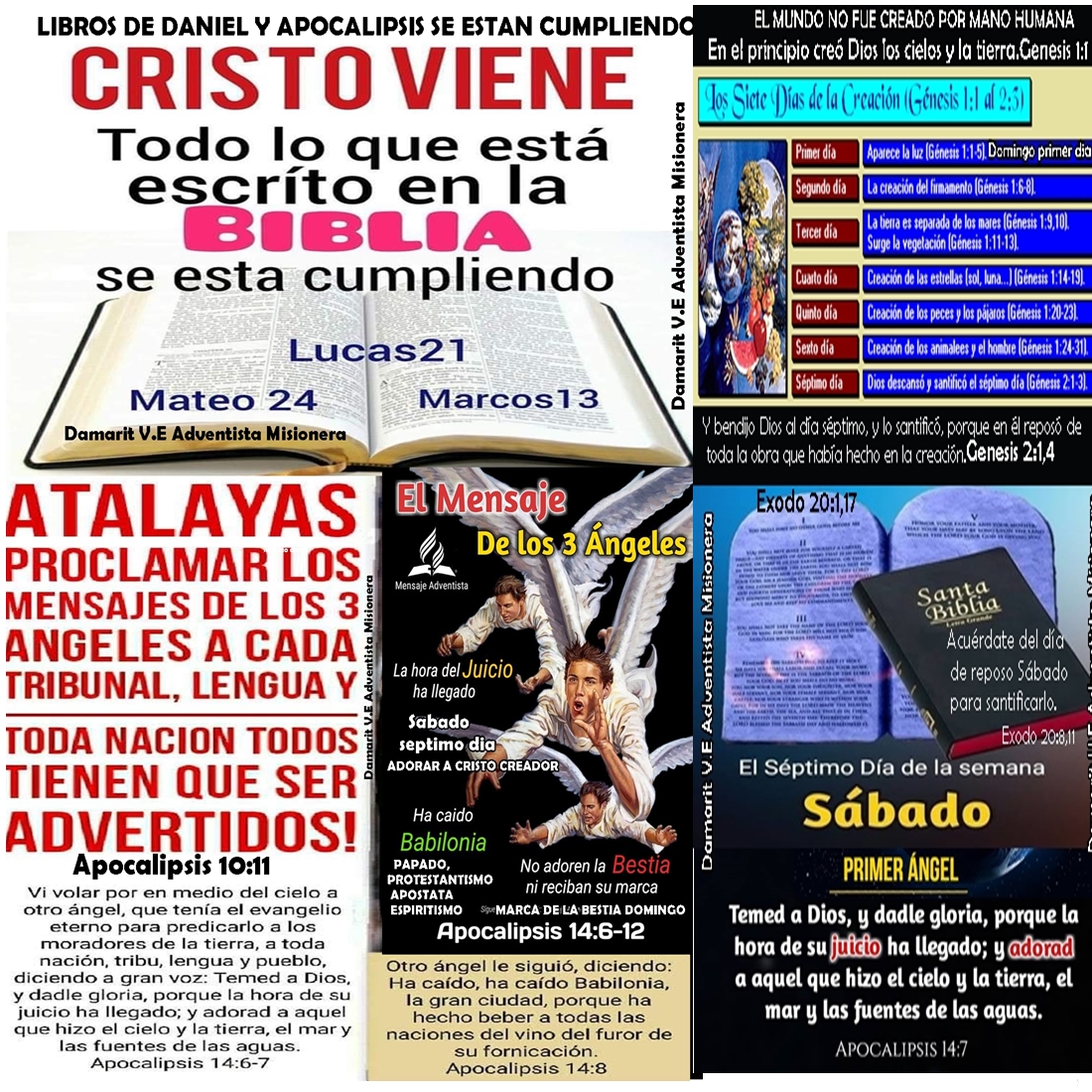 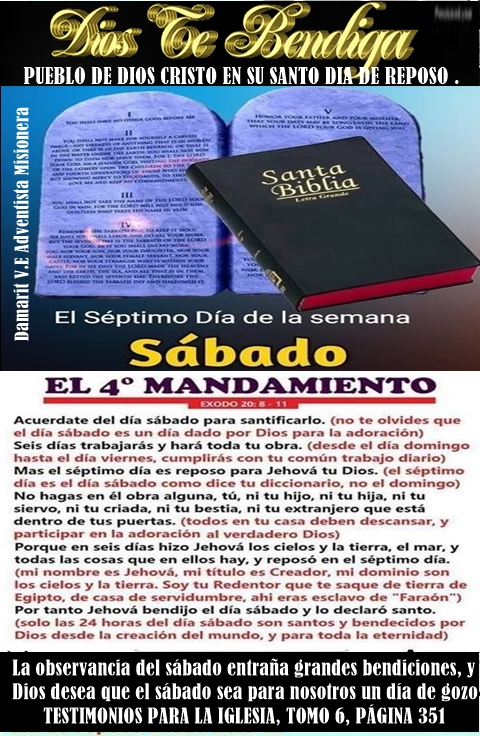
|
|
|
|
|
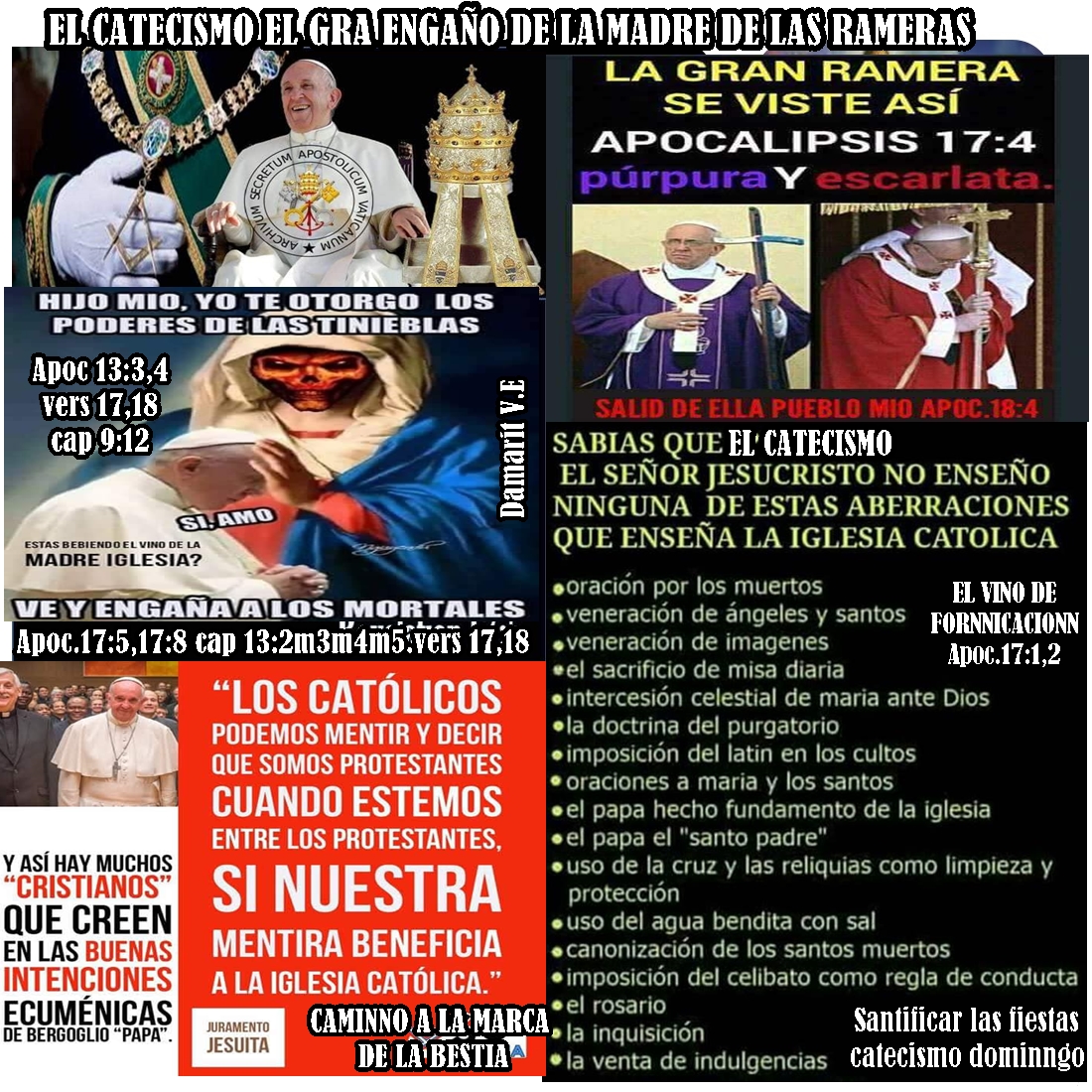
.jpg) 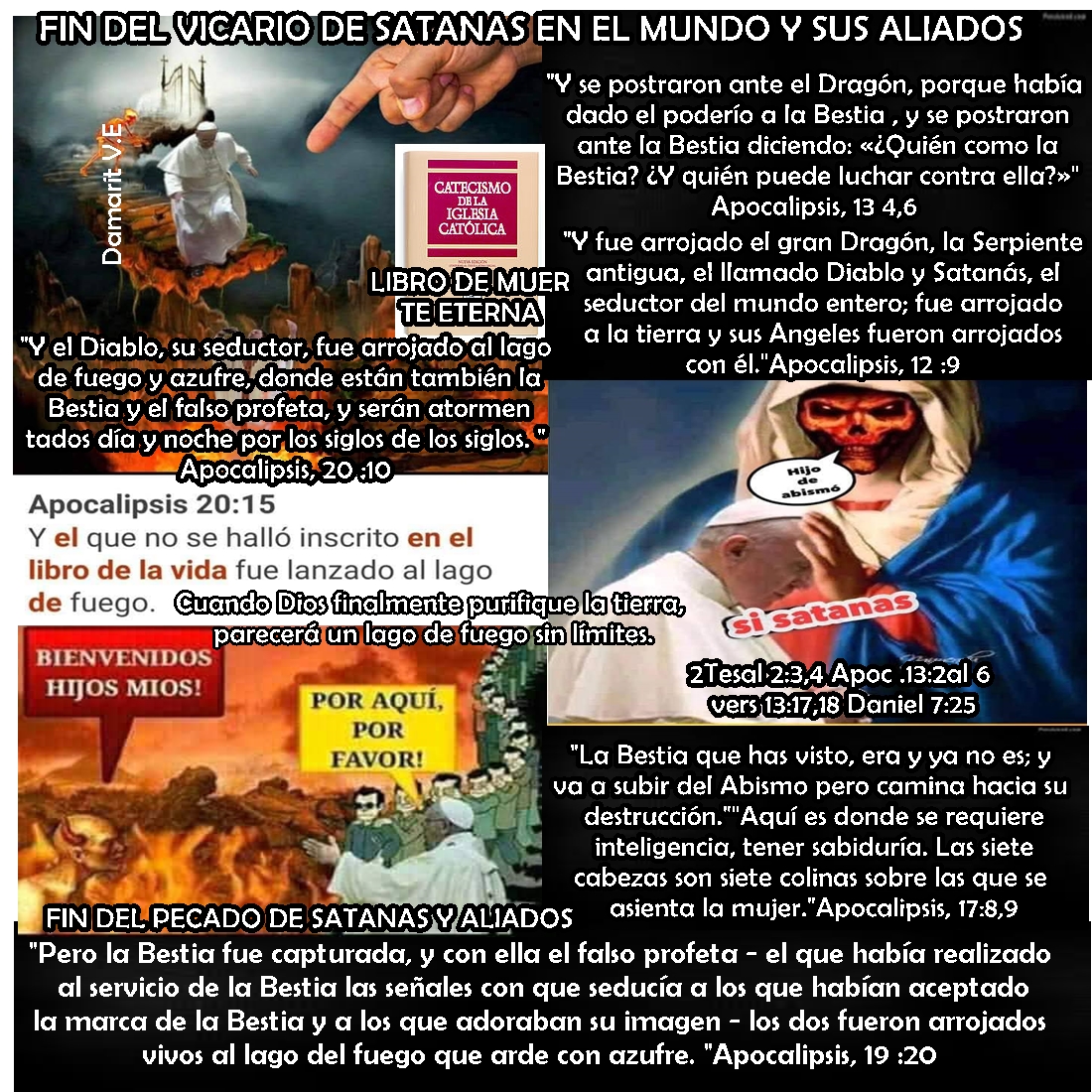
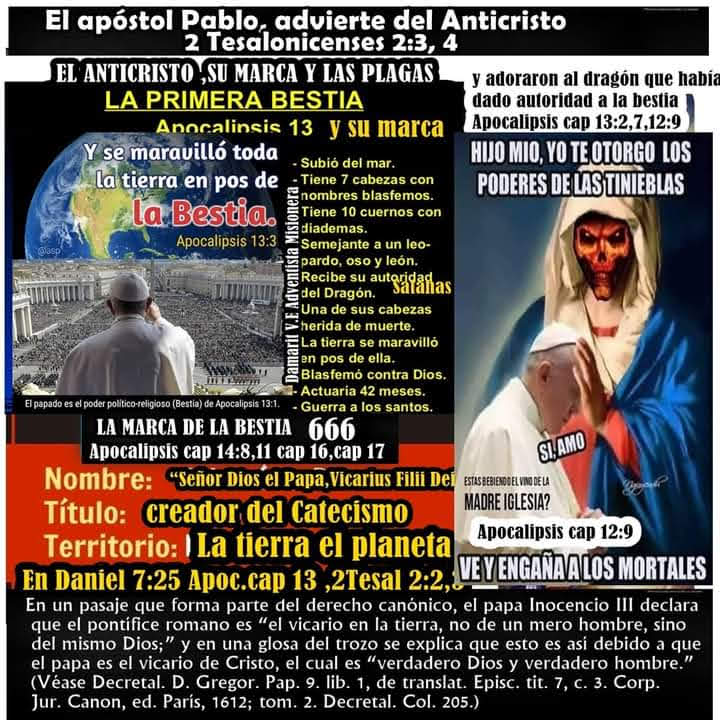 
Agenda 2030 Vaticano ONU jesuitas comunistas Laudato si cambio climático catecismo domingo rezar María los muertos purgatorio LGTB aborto peor que Sodoma y GOMORRA .Apoc 14:8 8 Y un segundo Angel le siguió diciendo: «Cayó, cayó la Gran Babilonia, la que dio a beber a todas las naciones el vino del furor.»cap 17:8,11,CAP16:13
Cristo destruye Babilonia ,ORGANISACION de personas política religiosa falsa satánica .Apoc 12:3,9,13:1,7,EEUU HIJAS DEL PAPADO PROTESTANTISMO APOSTA 13:11,18
Apocalipsis (de Juan) 16-> Ver. 13> Vi. Ver com. Ap 1:1. De la boca. La boca es el instrumento del habla. Estos “tres espíritus inmundos” que salen de las bocas del “dragón”, de la “bestia” y del “falso profeta”, representan la política que esta triple unión religiosa proclamará al mundo, la cual se menciona en el Ap 17:2 como el “vino” de Babilonia (ver com. Ap 16:14; Ap 17:2; Ap 17:6). Dragón. Ver com. Ap 12:3; Ap 13:1. El primer miembro de esta triple unión religiosa se identifica generalmente con el espiritismo o con el paganismo. Este último consiste principalmente en la adoración de espíritus maléficos, y por eso se parece esencialmente al espiritismo moderno tal como se practica en los países cristianos. La bestia. Ver com. Ap 13:1; Ap 17:3; Ap 17:8. Falso profeta. Evidentemente debe identificarse con la segunda bestia del Ap 13:11-17 (ver com. Ap 16:11), que apoya a la primera bestia de los Ap 16:1-10, y que por medio de los milagros que tiene el poder de hacer en presencia de la bestia (Ap 16:12-14), engaña a los hombres para que le hagan a ésta una “imagen”. Cf. Ap 19:20; Ap 20:10. Tres espíritus inmundos. Los defensores de ambas opiniones concuerdan en identificar al “dragón”, la “bestia” y el “falso profeta”, con el espiritismo moderno o paganismo, el papado, y el protestantismo apóstata (cf. Ap 13:4; Ap 13:14-15; Ap 19:20; Ap 20:10), respectivamente. Los “tres espíritus inmundos” evidentemente simbolizan o representan a este trío maléfico de poderes religiosos, que juntos constituyen la “gran Babilonia” de los últimos días (Ap 16:13-14; Ap 16:18-19; ver com. Ap 16:19; Ap 17:5). A manera de ranas. Tal vez no deba atribuirse ningún significado a esta comparación, que quizá sólo tiene el propósito de destacar lo repulsivo que son los “tres espíritus inmundos” delante de Dios. ]
Apoc (de Juan) 16-> Ver. 18> Voces. O “sonidos”, “ruidos”. Cf. Ap 4:5; Ap 8:5; Ap 11:19. Lo que dicen las “voces” puede ser semejante a la declaración del Ap 11:15 Truenos. O “fragor de truenos” Un gran temblor de tierra. Un terremoto literal como lo implica el resto del Ap 16:18 (ver com. Ap 16:1; cf. Ap 16:20-21), pero acompañado por un terremoto figurado que desmenuza a la Babilonia simbólica (Ap 16:19). Así como un terremoto literal deja una ciudad en ruinas, un terremoto simbólico traerá ruina y desolación a la “gran Babilonia” (ver com. Ap 17:16; Ap 18:6-8; Ap 18:21), La triple unión de los Ap 16:13-14 se desintegrará (cf. Isa 28:14-22). Cual no lo hubo jamás. Tanto literal como figuradamente. ] En la segunda venida de Cristo se oyó bajo la tierra un ruido de trueno, e inmediatamente después una violenta sacudida derribó la mayor parte de las ciudades del mundo islas “La sacudida” del terremoto “fue seguida instantáneamente del hundimiento de todas las iglesias y conventos, de casi todos los grandes edificios públicos y más de la cuarta parte de las casas. Unas horas después estallaron en diferentes barrios incendios que se propagaron con tal violencia durante casi tres días que la ciudad quedó completamente destruida. El terremoto sobrevino en un día de fiesta en que las iglesias y conventos estaban llenos de gente, y escaparon muy pocas personas”“El terror del pueblo era indescriptible. Nadie lloraba; el siniestro superaba la capacidad de derramar lágrimas. Todos corrían de un lado a otro, delirantes de horror y espanto, golpeándose la cara y el pecho, gritando: ‘¡Misericordia! ¡Llegó el fin del mundo!’ Las madres se olvidaban de sus hijos y corrían de un lado a otro llevando crucifijos. Desgraciadamente, muchos corrieron a refugiarse en las iglesias; pero en vano se expuso el sacramento; en vano aquella pobre gente abrazaba los altares; imágenes, sacerdotes y feligreses fueron envueltos en la misma ruina”
|
|
|
|
|
| LA SECTA MAS GRANDE DEL MUNDO E IGLESIA DE SATANAS .La Sinagoga de Satán explora la historia del satanismo espiritismo y su desarrollo, ahondando en la práctica de la brujería, los aquelarres, la magia negra y las misas eucaristía ,virgen María negras satanas al rezar purgatorio los muertos El título es una alusión a dos pasajes de la Biblia, específicamente Apocalipsis 2:9 y 3:9, donde aparece la expresión.Apocal CAP 12:3,9.
Dragón Satanás .
Apocalipsis (de Juan) 12-> Ver. 3
[V.3-> Señal. Gr. s’méion (ver com. Ap 12:1). Dragón escarlata. Este símbolo o poder se identifica en el Ap 12:9 como “la serpiente antigua, que se llama diablo y Satanás”. Este símbolo representa a Satanás actuando por medio de la Roma pagana, el poder que gobernaba el mundo cuando Jesús nació (ver com. Ap 12:4; cf. CS 491). El dragón se describe como de color “escarlata”, probablemente porque en toda su relación con la iglesia de Dios aparece como perseguidor y destructor de ella. Su propósito ha sido el de destruir a los hijos del Altísimo. Siete cabezas. También aparecen siete cabezas en la bestia que Juan vio surgir del mar 823 (Ap 13:1) y sobre la bestia bermeja (Ap 17:3). Las cabezas del Ap 17:9-10 se identifican como “siete montes” y “siete reyes”. Es, pues, razonable concluir que las siete cabezas del dragón representan poderes políticos que han fomentado la causa del dragón, y por medio de los cuales este ha ejercido su poder perseguidor. Algunos sostienen que el número “siete” se usa aquí como un número que indica plenitud, y que no es necesario identificar precisamente a siete naciones por medio de las cuales haya obrado Satanás. Cf. com. Ap 17:9-10. En cuanto a una descripción de la serpiente de siete cabezas en la mitología antigua, ver com. Isa 27:1. El Talmud también menciona un dragón con siete cabezas (Kiddushin 29b). Diez cuernos. La bestia de los cap. 13 y 17 también tenía cada una diez cuernos. Algunos sostienen que los diez cuernos del dragón son idénticos a los de las dos bestias, y que los de la segunda bestia (Ap 17:7) son idénticos a los diez cuernos de la cuarta bestia de Dan.7. Para identificar los diez cuernos de la cuarta bestia, ver com. Dan 7:1. Otros ven en los diez cuernos del dragón una designación más general de los poderes políticos menos importantes, por medio de los cuales ha obrado Satanás, en contraste con las siete cabezas, que pueden considerarse como una representación de los principales poderes políticos (ver com. “siete cabezas”). Sugieren que el número “diez” puede ser un número redondo, como sucede a menudo en otras partes de las Escrituras (ver com. Luc 15:8). Cf. com. Ap 17:9-10. En sus cabezas. Las insignias de realeza sobre las cabezas pueden tomarse como una evidencia adicional de que representan reinos políticos (ver com. “siete cabezas”). Diademas. Gr. diád’ma, literalmente “algo ceñido”, de diadéō, “ceñir”. Esta palabra se usaba para describir la insignia de realeza de los reyes persas, una cinta azul bordeada de blanco, que se usaba sobre el turbante. Después llegó a ser usada como señal de realeza. Diád’ma sólo aparece aquí y en Ap 13:1 y Ap 19:12. Diád’ma, que contrasta con stéfanos, también se traduce “corona” en el NT (Mat 27:29; 1Co 9:25; 2Ti 4:8; etc,) Stéfanos era una guirnalda que con frecuencia significaba el premio o trofeo que se daba a los vencedores (ver com. 1Co 9:25). ]
Apocalipsis (de Juan) 12-> Ver.
[V.7-> Batalla en el cielo. Juan presenta ahora brevemente la historia del gran conflicto que hubo en el cielo entre Satanás y Cristo, desde su origen hasta el momento en que Cristo triunfó en la cruz (Ap 12:7-9 cf. Col 2:14-15), cuando Satanás fue arrojado definitivamente del cielo a la tierra (Ap 12:10-12), y el desarrollo de ese conflicto en la tierra hasta el tiempo del fin (Ap 12:13-16; ver com. Dan 11:35). Esta breve reseña queda como trasfondo de la extensa descripción del desarrollo del conflicto durante el tiempo del fin, por medio del cual esa lucha finalmente termina con éxito (Ap 12:17 a 20:15). En el Ap 12:9-11 Juan habla más particularmente de la fase del conflicto librado en el cielo en relación con la muerte de Cristo en la cruz. En cuanto a la evidencia del contexto que apoya esta conclusión, ver com. Ap 12:9. Aunque el revelador enfoca primordialmente su atención sobre el punto culminante del conflicto, que tuvo lugar en la cruz, la frase “hubo una gran batalla en el cielo” también puede entenderse como que se refiere al tiempo anterior a la creación de la tierra, cuando la hostilidad del dragón comenzó porque Lucifer aspiraba a ser semejante a Dios (ver com. Isa 14:13-14; Eze 28:12-16). En ese tiempo Satanás fue expulsado del cielo junto con los ángeles que simpatizaban con él (ver 2Pe 2:4; Jud 1:6). Los ángeles leales no entendieron plenamente entonces todas las consecuencias que estaban implicadas; pero cuando Satanás vilmente derramó la sangre de Cristo, quedó completa y eternamente desenmascarado delante del mundo celestial. Desde ese momento sus actividades fueron aún más restringidas (ver DTG 709). Miguel. Gr. Mija’l, una transliteración del Heb. mika’el, que significa “¿quién semejante a Dios?” Miguel es mencionado como “uno de los principales príncipes” (Dan 10:13), como “el gran príncipe” (Dan 12:1), y también como “el arcángel” (Jud 1:9). La literatura judía describía a Miguel como el más encumbrado de los ángeles, el verdadero representante de Dios, y lo identificaba como el ángel de Jehová (ver Talmud Yoma 37ª; Midrash Rabbah, com. Gen 18:3; Exo 3:2). Según el Midrash Rabbah, com. Exo 12:29, Miguel fue el ángel que vindicó a Israel contra las acusaciones de Satanás. Un examen cuidadoso de las referencias bíblicas a Miguel permite concluir que no es otro sino nuestro bendito Señor y Salvador Jesucristo (ver com. Dan 10:13; cf. com. Jud 1:9).]
Apocalipsis (de Juan) 12-> Ver. 8
[V.8-> No prevalecieron. Como la frase “batalla en el cielo” (Ap 12:7) puede tener una doble aplicación cuando se describe tanto el conflicto inicial en el cielo entre Lucifer y Dios como el que comenzó en la tierra entre Satanás y el Cristo encarnado, las palabras “no prevalecieron” pueden aplicarse apropiadamente a ambas etapas del conflicto, pues Satanás no tuvo éxito en ninguna de las dos. Ya lugar. Estas palabras pueden entenderse como una referencia al lugar que una vez poseyeron u ocuparon, o se les había asignado. Lucifer fue una vez el querubín “protector” (ver com. Eze 28:14), y los ángeles que se unieron con él en la rebelión ejercían diversas funciones de responsabilidad. Lucifer y sus ángeles perdieron esas funciones cuando fueron arrojados del cielo. ]
Apocalipsis (de Juan) 12-> Ver. 9
[V.9-> Fue lanzado fuera. Satanás y sus ángeles fueron expulsados del cielo en las edades pasadas (2Pe 2:4), antes de la creación de este mundo Sin embargo, parece que hasta el momento del drama de la cruz podía llegar hasta los seres celestiales, y en un grado limitado, posiblemente como “príncipe de este mundo” (Jn 12:31; Luc 4:6), pero no como habitante del cielo, podía entrar en los recintos celestiales ver com. “en tierra”). Esta puede ser, sin embargo, la expulsión definitiva que ocurrió en la cruz, como lo declaró nuestro Señor (Jn 12:31-32; . Es evidente por el contexto (Ap 12:10-13) que Juan se está refiriendo más específicamente a los sucesos relacionados con el triunfo de Cristo en la cruz. Pueden notarse los siguientes puntos: 1. La proclamación que hace una “gran voz en el cielo” (Ap 12:10-12) es más o menos un paréntesis, cuyo propósito es explicar el significado de la expulsión de Satanás (Ap 12:9), en primer lugar a los habitantes del cielo, y luego a los de esta tierra. Después de este paréntesis explicatorio, el Ap 12:13 continúa la narración de las actividades de Satanás a partir del lugar donde había quedado en el Ap 12:9. Por consiguiente, los Ap 12:10-12 constituyen, principalmente, una declaración relativa al estado del plan de salvación en el momento en que Satanás fue “arrojado a la tierra”. 2. La primera declaración de la “gran voz” consiste en una serie de hechos relacionados con el triunfo de Cristo en la cruz sobre Satanás: se aseguró el plan de la “salvación”, se dio “poder” para resistir los engaños de Satanás, se aseguró el “reino” de Cristo y fue confirmado su “poder” literalmente “autoridad” de ser el Salvador del hombre, el sumo sacerdote y rey (Mat 28:18; CS 558). 3. La razón que se da en Ap 12:10 para esta cuádruple victoria es muy especifica: que “ha sido lanzado fuera el acusador de nuestros hermanos”, lo cual relaciona claramente lo que se ha hecho con la expulsión del Ap 12:9. 4. En el tiempo de la expulsión de los Ap 12:9-10; Ap 12:13, “el acusador de nuestros hermanos” ya los había estado acusando activamente “delante de nuestro Dios día y noche”. Es obvio que esta caída ocurrió después de que Satanás había estado acusando durante cierto tiempo a “los hermanos”; por lo tanto, según parece ésta no puede ser la expulsión original de Satanás, la cual fue, por supuesto, antes de la creación de la tierra y de Adán y Eva. 5. El Ap 12:11 declara específicamente que fue “la Sangre del Cordero” -la muerte de Cristo en la cruz- la que había hecho posible la victoria sobre “el acusador de nuestros hermanos”. El gran dragón. Ver com. Ap 12:3. Serpiente. Una referencia a la serpiente que engañó a Eva (Gen 3:1). Antigua. Gr. arjáios, “antiguo”, “viejo”, de arj’, “principio”. “Arcaico” deriva de arjáios. Cf. Jn 8:44. Diablo. Gr.Diábolos, “calumniador” (ver com. Mat 4:1). Satanás. Gr. Satanás, transliteración del Heb. Sátan, que significa “adversario” (ver com. Zac 3:1). Engaña. Gr. Planáō, “hacer errar”, “descarriar”. “engañar” (ver com. Mat 18:12). Mundo. Gr. oikoumén’ “el mundo habitado”, de oikéō, “morar” (ver com. Mat 4:8). A la tierra. El conflicto en el cielo comenzó debido a los planes para la creación del hombre Cuando la tierra fue creada y entregada a Adán, Satanás se esforzó para hacer que cayera el hombre que acababa de ser creado. Cuando consiguió que Adán y Eva cayeran, reclamó la posesión de la tierra (ver com. Mat 4:8-9); pero lo limitó sus esfuerzos a esta tierra sino que también tentó a los habitantes de otros mundos . No será sino hasta la segunda venida de Cristo cuando Satanás será completamente confinado a esta tierra durante mil años (ver com. Ap 20:3; ]
Apocalipsis (de Juan) 13-> Ver. 1
[V.1-> Me paré. La evidencia textual se inclina (cf. p. 10) por la variante “y él se paró”. Si se adopta esta variante, sería mejor unir “y él se paró sobre la arena del mar” con el Ap 12:17, como se hace en ciertas ediciones griegas y versiones castellanas (BJ, BC, NC). “El” se referiría entonces al dragón que está en la playa del mar esperando el surgimiento de la bestia, con el propósito de investirla con su poder y autoridad (Ap 13:2). Pero si se acepta la variante “me paré”, entonces Juan describe simplemente el promontorio desde donde vio cómo ascendería la bestia. La arena del mar. El mar sin duda representa pueblos, naciones y lenguas (ver com. Ap 17:1-2; Ap 17:8; cf. com. Dan 7:2). Del mar. Esta bestia sube “del mar”, pero la bestia del Ap 13:11 sube “de la tierra”. La una sube o surge de entre multitudes de pueblos (ver com. “arena del mar”); la otra, en donde la población es escasa (ver com. Ap 13:11). Una bestia. En cuanto al significado de bestia en la profecía simbólica, ver com. Dan 7:3; y en cuanto a la identificación de la bestia, ver com. Ap 13:2. Siete cabezas. Algunos identifican estas cabezas con las que tiene el dragón y también con las de la bestia del cap. 17 (ver com. Ap 12:3). Otros ven en estas cabezas las diversas organizaciones políticas por medio de las cuales actúa la nueva bestia después que el dragón de siete cabezas le cede “su poder y su trono, y grande autoridad” (Ap 13:2). Para un comentario sobre el número siete, ver com. Ap 1:11. Diez cuernos. Algunos identifican estos cuernos con los del dragón (ver com. Ap 12:3). Otros limitan la aplicación de estos cuernos a naciones por medio de las cuales el poder representado por la bestia ejerció su voluntad y autoridad (ver com. Ap 12:3). Diademas. Gr. diád’ma, “corona real” (ver com. Ap 12:3). Estas coronas en los cuernos confirman la identificación de los cuernos como poderes políticos. Nombre. La evidencia textual se inclina (cf. p. 10) por el texto “nombres” (BA, NC). Blasfemo. Gr. blasf’mía, que significa “injuria”, “calumnia”, cuando se dirige contra los hombres, y palabras impías, cuando se dirigen contra Dios. Sin duda aquí predomina el último sentido. El nombre o los nombres aparecen como si estuvieran escritos sobre las cabezas. Representan indudablemente los títulos blasfemos usurpados por la bestia (ver com. Dan 7:25). ]
Apocalipsis (de Juan) 13-> Ver. 2
[V.2-> Leopardo... oso... león. Una evidente alusión al simbolismo de Dan. 7. Daniel vio tres bestias: la primera era semejante a un león; la segunda, a un oso; la tercera, a un leopardo. La bestia que vio Juan tenía características físicas tomadas de las tres, lo que indica, sin duda alguna, que el poder representado por la bestia de Apocalipsis posee características evidentes en los imperios de Babilonia, Persia y Grecia. Algunos han notado que Juan alude a estos poderes en el orden inverso de su aparición en la historia, o mirando retrospectivamente desde sus días. Dragón. Ver com. Ap 12:3. Le dio su poder. El dragón representa en primer lugar a Satanás, y en un sentido secundario recibió del dragón “su poder, y su trono, y grande autoridad” fue, claramente, la Roma papal. “De las ruinas de la Roma política se levantó el gran imperio moral en la “forma gigantesca” de la Iglesia Romana” (A. C. Flick, The Rise of the Mediaeval Church [ 1900], p. 150). Esta identificación es confirmada 832 por las especificaciones enumeradas en los versículos siguientes. Detrás de todo estaba Satanás, que procuraba exterminar a la iglesia. Cuando se dio cuenta que sus esfuerzos para aniquilar a los seguidores de Cristo por medio de la persecución resultaban ineficaces, cambió sus tácticas y se propuso separar de Cristo a la iglesia por medio del establecimiento de un sistema religioso falso y complejo. El dragón no actúa directamente por medio del paganismo, sino que empieza a trabajar tras la fachada de una organización profesamente cristiana, esperando de este modo disfrazar su identidad. Trono. Gr. thrónos. Los papas ascendieron al trono de los césares. La capital del sistema papal era la misma que la que había ocupado el Imperio Romano durante su apogeo. Grande autoridad. El papado predominó en los asuntos políticos y religiosos, y sobre la conciencia de los hombres. ] Apocalipsis (de Juan) 13-> Ver.
[V.3-> Una de sus cabezas. Ver com. Ap 13:1. Herida. Gr. sfázō, “matar”, “degollar”. Es afín de la palabra que se traduce “inmolado” en el Ap 5:6. Los adventistas creen que esta predicción se cumplió asombrosamente en 1798, cuando el general Berthier entró en Roma a la cabeza del ejército francés y declaró que había terminado el poder político del papa. Tomó prisionero al papa, lo llevó a Francia, donde poco después murió (ver com. Dan 7:25; CS 492). Sin embargo, este suceso sólo marcó la culminación de una larga serie de acontecimientos. La decadencia del poder papal había comenzado muchos años antes (ver Nota Adicional de Dan. 7). El comienzo de la Reforma protestante fue un hecho significativo en la larga serie de acontecimientos. Su herida. Gr. pl’g’, “un golpe”, también la herida producida por un golpe. Uno u otro significado puede adaptarse en este versículo. La “herida de muerte” podría ser, o el golpe que produce la muerte, o la herida que produce la muerte. Fue sanada. En los años que transcurrieron después de la Revolución Francesa se produjo un reavivamiento gradual del sistema papal. El papa sufrió un nuevo golpe en 1870, cuando le fueron quitados los Estados papales. Un suceso importante aconteció en 1929 cuando, por el tratado de Letrán, el poder temporal le fue restaurado al papa. Recibió entonces el gobierno de la Ciudad del Vaticano, una sección de la ciudad de Roma, que ocupa una extensión de unas 44 hectáreas. Sin embargo, el profeta contempla que hay una restauración mucho mayor. Vio la herida completamente curada, como lo insinúa el texto griego. Juan vio, además, que después de la curación “todos los moradores de la tierra” -excepto unos pocos fieles- adoraron a la bestia (Ap 13:8; ). Esta adoración aún se halla en el futuro. Aunque el papado recibe el homenaje de ciertos sectores, enormes conjuntos humanos no le rinden pleitesía. Pero esto cambiará. La bestia del Ap 13:11 “hace que la tierra y los moradores de ella adoren a la primera bestia, cuya herida mortal fue sanada” (Ap 13:12). Se maravilló toda la tierra. Parecía increíble que pudiera resurgir el poder papal; pero la profecía ha declarado que así sucedería. ]
Apocalipsis (de Juan) 13-> Ver. 4
[V.4-> Adoraron al dragón. Adorar a la bestia es en verdad adorar al dragón, porque la bestia es el instrumento o agente visible del dragón, que lleva a cabo los propósitos del dragón. El período del restablecimiento del papado también se caracterizará por la actividad sin paralelo del espiritismo. Detrás del espiritismo está Satanás que obra “con todo engaño de iniquidad” (2Ts 2:10). Por medio del catolicismo romano, el espiritismo y el protestantismo apóstata, Satanás se propone lograr que todo el mundo le adore; y lo conseguirá, excepto de un noble remanente que se negará a acceder a sus pretensiones (Ap 12:17; Ap 13:8). Adoraron a la bestia. Ver com. “adoraron al dragón”. ¿Quién como? Tal vez sea una parodia de expresiones similares dirigidas a Dios (Exo 15:11; Sal 35:10; Sal 113:4). ¿Podrá luchar contra ella? La resistencia a las demandas de la bestia evidentemente significaba guerra. Se sugiere que regiría por la fuerza de las armas y que la resistencia sería inútil; pero finalmente Cristo y los ejércitos del cielo tendrán éxito en su lucha contra ella, y la arrojarán viva “dentro de un lago de fuego que arde con azufre” (Ap 19:20). ]
Apocalipsis (de Juan) 13-> Ver. 12
[V.12-> Autoridad. Este versículo es una ampliación de la frase “hablaba como dragón” (Ap 13:1). El cumplimiento es aún futuro (ver com. Ap 13:11). Durante el apogeo de su poder, la primera bestia, el papado 835(ver com. Ap 13:2), ejerció amplia autoridad en asuntos tanto religiosos como políticos (ver com. Dan 7:8). Para que la segunda bestia ejerza toda la autoridad de la primera bestia, tendrá que entrar en el campo de la religión y procurar imponerse en el culto religioso. Este paso por parte de los Estados Unidos de Norteamérica significará que renuncia completamente a su política actual de conceder plena libertad religiosa a sus ciudadanos. Este cambio se predice aquí (ver 2JT 151). El cambio de política se presentará, sin duda, en forma aparentemente inofensiva. Ya se han hecho repetidos intentos para establecer leyes más estrictas en cuanto a la observancia del domingo como día de culto. Se espera que así mejoren los principios morales de la sociedad. Pero, por inofensivo que parezca, cualquier tentativa de regular las prácticas religiosas mediante una ley es una violación del principio fundamental de la libertad religiosa. Esta profecía predice que la institución del domingo, que es fruto del papado (ver com. Dan 7:25), será un día impuesto por ley bajo amenaza de sanciones económicas y finalmente de muerte (Ap 13:12-18). En presencia. La primera bestia, que había sido mortalmente herida, ha revivido, y se ocupa de nuevo de los asuntos mundiales. Su promotora e instrumento es la segunda bestia con dos cuernos de cordero. Hace que la tierra. O sea sus habitantes. Este movimiento es más que una empresa nacional; asume proporciones internacionales Adoren. La profecía indica la promulgación de alguna ley de carácter religioso cuya observancia será considerada como un acto de culto, en el cual el participante reconoce la autoridad de la primera bestia en asuntos religiosos. Una clave de la naturaleza de tal edicto se halla en el Ap 14:9-12. Esos versículos establecen un contraste entre los santos y los adoradores de la bestia y su imagen, y destacan que una de las características que distingue a los santos es la observancia de los mandamientos de Dios (Ap 13:12). Según Daniel, el poder aquí representado como la bestia pensaría “en cambiar los tiempos y la ley” (Ap 7:25). La historia registra un intento sumamente audaz de cambiar la ley divina: la sustitución del sábado, día de reposo del Señor, por el domingo, primer día de la semana (ver com. Dan 7:25). Es, pues, posible ver aquí una aplicación específica a un decreto civil que impondrá la observancia del domingo, una institución del papado, prohibiendo la observancia del sábado de la ley de Dios. Los hombres serían inducidos de esta manera a “adorar” a la “primera bestia”. Obedecerán su orden pasando por encima de la ley de Dios en cuanto al día de reposo. Ver com. Ap 13:16-17. El asunto del día de reposo es, por supuesto, sólo un aspecto del homenaje universal que la “bestia” recibirá finalmente (ver com. Ap 13:8). Lo que se prevé es un movimiento universal bajo la dirección de Satanás, quien intentará asegurar para sí la adhesión de los habitantes de esta tierra. Tendrá éxito en unir los diversos elementos religiosos y en asegurar la lealtad de los hombres para la nueva organización modelada a semejanza de la antigua (ver com. Ap 13:14). Satanás es el poder que está detrás de la “bestia”. El es el verdadero anticristo cuyo propósito es hacerse igual a Dios (ver 2Ts 2:9-10;
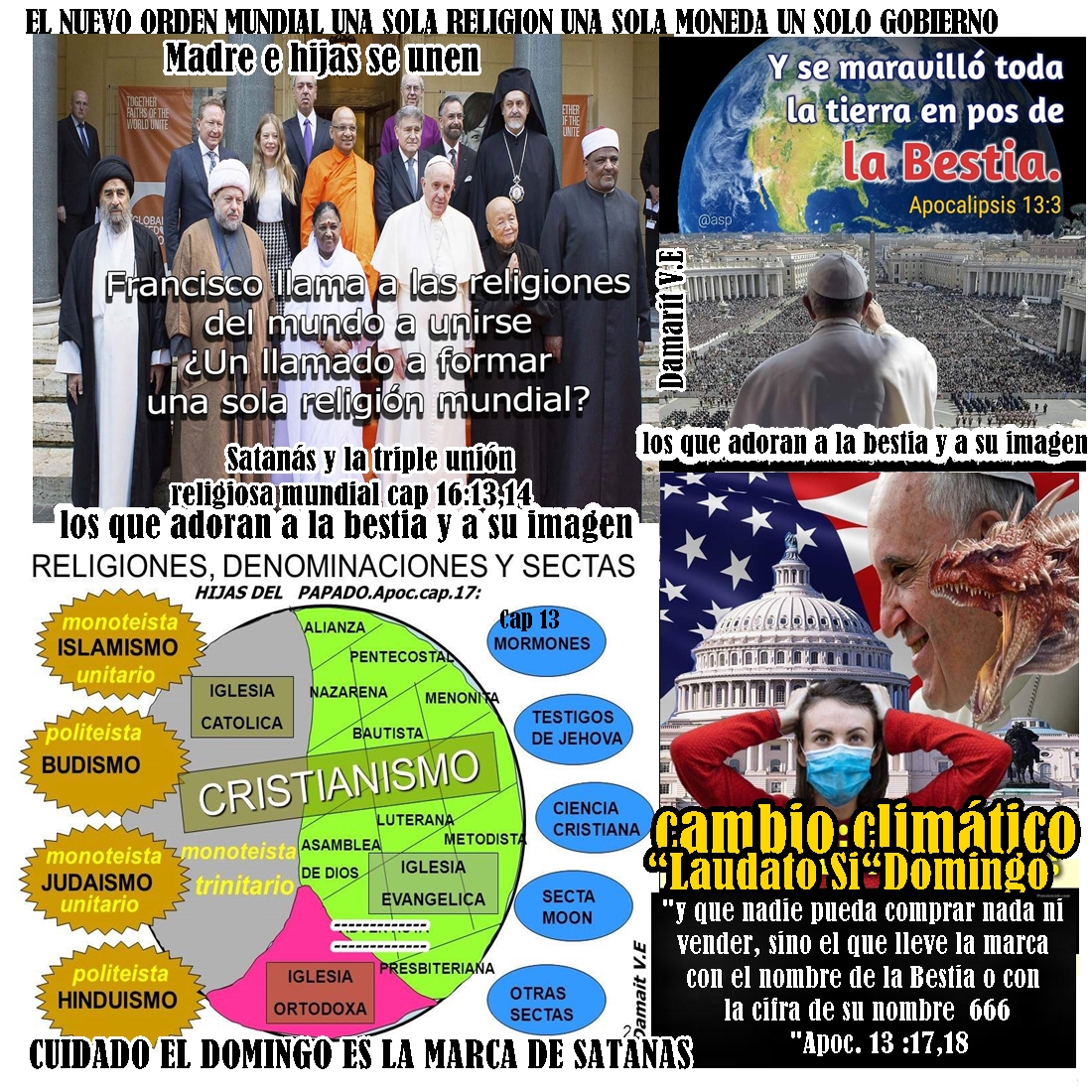
|
|
|
|
|

 
LOS PERDIDOS QUE NO ACEPTARON EL LLAMADO DE CRISTO SALIR DE ESTA UNION SATANICO Apoc18:2,3,4,5. AGENDA 2030 VATICANO ONU EEUU LAUDATO SI CAMBIO CLIMATICO COP28 DOMINGO CATECISMO AGENDA DE SATANAS LA BESTIA Y SU IMAGEN . .APOCAL 14:8,11,9 Un tercer Angel les siguió, diciendo con fuerte voz: «Si alguno adora a la Bestia y a su imagen, y acepta la marca en su frente o en su mano,10 tendrá que beber también del vino del furor de Dios, que está preparado, puro, en la copa de su cólera. Será atormentado con fuego y azufre, delante de los santos Angeles y delante del Cordero.11 Y la humareda de su tormento se eleva por los siglos de los siglos; no hay reposo, ni de día ni de noche, para los que adoran a la Bestia y a su imagen, ni para el que acepta la marca de su nombre.» CAP13:17,18 666 ,19:20,21 Pero la Bestia fue capturada, y con ella el falso profeta - el que había realizado al servicio de la Bestia las señales con que seducía a los que habían aceptado la marca de la Bestia y a los que adoraban su imagen - los dos fueron arrojados vivos al lago del fuego que arde con azufre. Allí hay sacerdotes y prelados papistas, que dijeron ser los embajadores de Cristo y que no obstante emplearon instrumentos de suplicio, calabozos y hogueras para dominar las conciencias de su pueblo. Allí están los orgullosos pontífices que se ensalzaron por encima de Dios y que pretendieron alterar la ley del Altísimo. Aquellos así llamados padres de la iglesia tienen que rendir a Dios una cuenta de la que bien quisieran librarse. Demasiado tarde ven que el Omnisciente es celoso de su ley y que no tendrá por inocente al culpable de violarla. Comprenden entonces que Cristo identifica sus intereses con los de su pueblo perseguido, y sienten la fuerza de sus propias palabras: “En cuanto lo hicisteis a uno de los más pequeños de estos mis hermanos, a mí lo hicisteis.” Mateo 25:40 (VM). Todos los impíos del mundo están de pie ante el tribunal de Dios, acusados de alta traición contra el gobierno del cielo. No hay quien sostenga ni defienda la causa de ellos; no tienen disculpa; y se pronuncia contra ellos la sentencia de la muerte eterna.La sacudida” del terremoto “fue seguida instantáneamente del hundimiento de todas las iglesias y conventos, de casi todos los grandes edificios públicos y más de la cuarta parte de las casas. Unas horas después estallaron en diferentes barrios incendios que se propagaron con tal violencia durante casi tres días que la ciudad quedó completamente destruida. El terremoto sobrevino en un día de fiesta en que las iglesias y conventos estaban llenos de gente, y escaparon muy pocas personas” “El terror del pueblo era indescriptible. Nadie lloraba; el siniestro superaba la capacidad de derramar lágrimas. Todos corrían de un lado a otro, delirantes de horror y espanto, golpeándose la cara y el pecho, gritando: ‘¡Misericordia! ¡Llegó el fin del mundo!’ Las madres se olvidaban de sus hijos y corrían de un lado a otro llevando crucifijos. Desgraciadamente, muchos corrieron a refugiarse en las iglesias; pero en vano se expuso el sacramento; en vano aquella pobre gente abrazaba los altares; imágenes, sacerdotes y feligreses fueron envueltos en la misma ruina” Apoc 9:19,20 Los impíos reciben su recompensa en la tierra. Proverbios 11:31. “Serán estopa; y aquel día que vendrá, los abrasará, ha dicho Jehová de los ejércitos.” Malaquías 4:1. Algunos son destruídos como en un momento, mientras otros sufren muchos días. Todos son castigados “conforme a sus hechos.” Habiendo sido cargados sobre Satanás los pecados de los justos, tiene éste que sufrir no sólo por su propia rebelión, sino también por todos los pecados que hizo cometer al pueblo de Dios. Su castigo debe ser mucho mayor que el de aquellos a quienes engañó. Después de haber perecido todos los que cayeron por sus seducciones, el diablo tiene que seguir viviendo y sufriendo. En las llamas purificadoras, quedan por fin destruídos los impíos, raíz y rama,—Satanás la raíz, sus secuaces las ramas. La penalidad completa de la ley ha sido aplicada; las exigencias de la justicia han sido satisfechas; y el cielo y la tierra al contemplarlo, proclaman la justicia de Jehová.EL PURGATORIO NO EXISTE NI LOS MUERTOS NI MARIA ESTA EN EL CIELO SOLO CRISTO LOS IMPIOS PIERDEN SU VIDA ETERNA NADIE LOS SALVO DURAN LAS PLAGAS NI MARIA NI LOS MUERTOS SANTOS QUE ROGABAN O REZABAN NI CURAS NI PAPAS LOS SALVAN TENDRAN LAS PLAGAS TANTO CURAS PAPAS Y FUEGO DESDE EL CIELO TIERRA COMO SODOMA GOMORRA PIR DESPRECIAR EL SANTO SABADO SEPTIMO DIA Y SU LEY DEL CIELO LA TIERRA QUE CRISTO NOS DIO CON SU PROPIO DEDO .
|
|
|
|
|
| Enviado: 23/05/2024 12:13 |
|
|
|
|
|

The letter S is the 19th letter of the Latin alphabet and the English alphabet. It is also used in other Western European languages and other Latin alphabets.
   
POPE NUMBER 266
9 LUNAR MONTHS=266 DAYS
FR-ANC-ISCO / J-ANUK-A
1/1-23/9 GREGORIAN CALENDAR=266 DAYS
266 DAYS=19*2*7 DAYS (SATURDAY)=WOMAN IN PREGNANT=LUNAR PHASE (36=4*9) (1+2+3+4+...36=666)
10/3-30/11 (JANUKAH=JOHN 10 22=24/9-KISLEV HAGGAI 2 10 )=266 DAYS
10 On the twenty-fourth day of the ninth month, in the second year of Darius, the word of the Lord came by Haggai the prophet, 11 “Thus says the Lord of hosts: Ask the priests about the law: 12 ‘If someone carries holy meat in the fold of his garment and touches with his fold bread or stew or wine or oil or any kind of food, does it become holy?’” The priests answered and said, “No.” 13 Then Haggai said, “If someone who is unclean by contact with a dead body touches any of these, does it become unclean?” The priests answered and said, “It does become unclean.” 14 Then Haggai answered and said, “So is it with this people, and with this nation before me, declares the Lord, and so with every work of their hands. And what they offer there is unclean. 15 Now then, consider from this day onward. Before stone was placed upon stone in the temple of the Lord, 16 how did you fare? When one came to a heap of twenty measures, there were but ten. When one came to the wine vat to draw fifty measures, there were but twenty. 17 I struck you and all the products of your toil with blight and with mildew and with hail, yet you did not turn to me, declares the Lord. 18 Consider from this day onward, from the twenty-fourth day of the ninth month. Since the day that the foundation of the Lord's temple was laid, consider: 19 Is the seed yet in the barn? Indeed, the vine, the fig tree, the pomegranate, and the olive tree have yielded nothing. But from this day on I will bless you.”

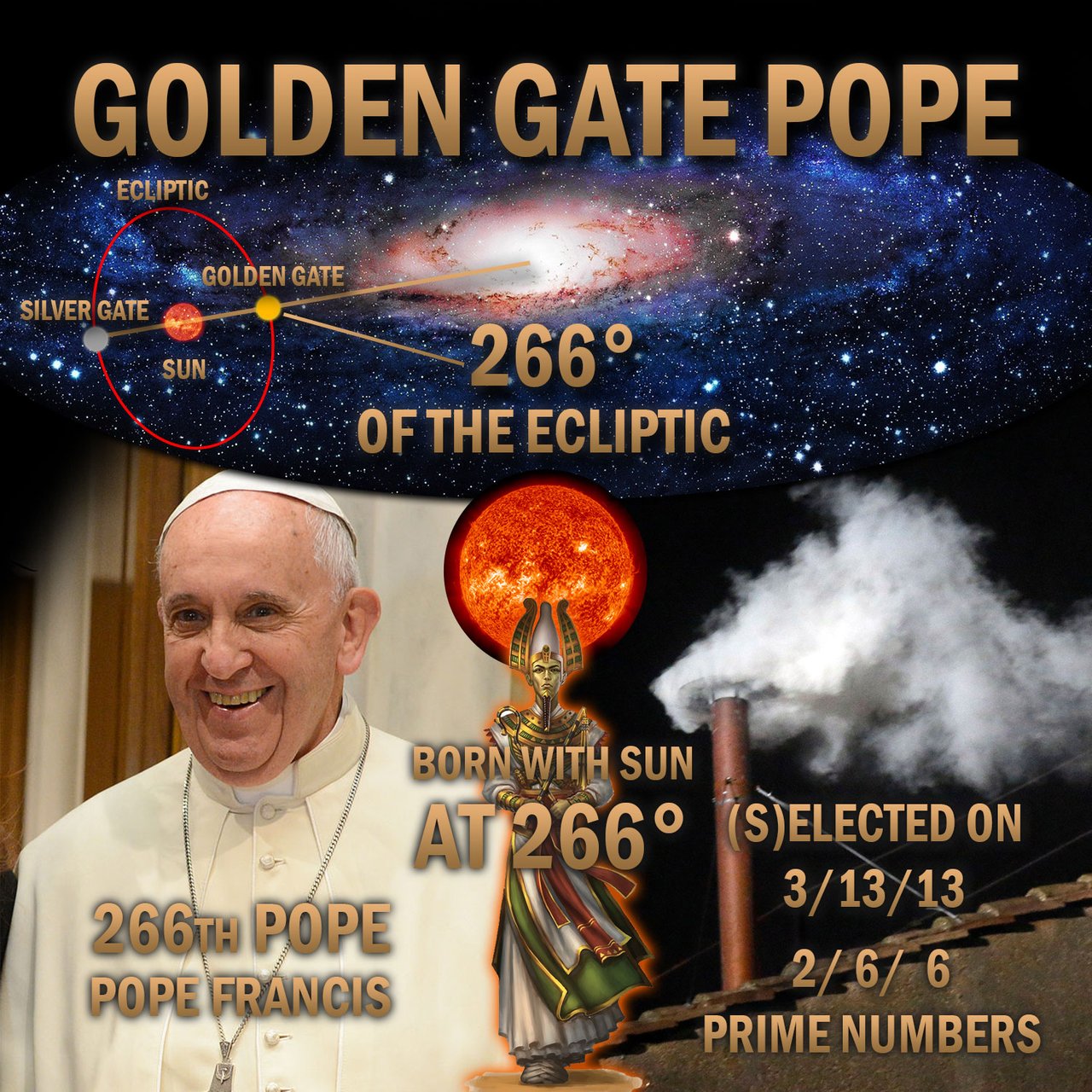
|
|
|
|
|
https://www.unrudodespertar.tv/wp-content/uploads/2020/07/Calendario-Bi%CC%81blico-Hebreo-Corregido-Astrono%CC%81mica-y-Agriculturalmente-optimized-1.pdf |
|
|
 Primer Primer
 Anterior
71 a 85 de 85
Siguiente Anterior
71 a 85 de 85
Siguiente
 Último
Último

|
|
| |
|
|
©2026 - Gabitos - Todos los derechos reservados | |
|
|

